Thank you for the update. Justice for victims does not exist as the only just act would be it not to have happened. Punishment is a form of revenge where the actions are tried to be equalized. Prevention is best though it often requires a willingness to go far beyond the initial act.
The Secret History of the Bargas
- Thread starter filcat
- Start date
-
We have updated our Community Code of Conduct. Please read through the new rules for the forum that are an integral part of Paradox Interactive’s User Agreement.
You are using an out of date browser. It may not display this or other websites correctly.
You should upgrade or use an alternative browser.
You should upgrade or use an alternative browser.
Threadmarks
View all 36 threadmarks
Reader mode
Reader mode
Recent threadmarks
Book II, Vol.I - The Great Khan (p.11) - The Storm Book II, Vol.I - The Great Khan (p.12) - The Turmoil Book II, Vol.I - The Great Khan (p.13) - The Lightning in the Eyes Book II, Vol.I - The Great Khan (p.14) - The Last of the Tuvans Book II, Vol.I - The Great Khan (p.15) - The Path Book II, Vol.I - The Great Khan (Epilogue) - The Hope Book II, Vol.II - The Historian (part 1) Book II, Vol.II - The Historian (part 2)Cannot even try to reply this while having only a basic understanding of the contemporary justice and law disciplines; also would not use archaic case examples, which are bereft of gains of social sciences and human rights, to make generalisations over discussing what is fair for whom, especially when it is a fictional case, even if it may have any inspirations from according historical records.Thank you for the update. Justice for victims does not exist as the only just act would be it not to have happened. Punishment is a form of revenge where the actions are tried to be equalized. Prevention is best though it often requires a willingness to go far beyond the initial act.
- 1
Book II, Vol.I - The Great Khan (p.15) - The Path
Book II - Volume I - The Great Khan - XV
The Path
Days are shortening, Rhomaios, for I know it is not the sun I was expecting, after the last words I uttered, I closed my eyes to regain my ezens.
Friend, your health is frightening every other, for they were here for you, running in the worry, tending you desperately, begging Tengri for your recovery. Why did you order them to leave? Now you have summoned me to your presence, I should tell you they –
For how long was I away in the deepest sea of sleep? How many days has it been?
Friend, they told me you should rest more, instead of exhausting your mind, speaking the words of the tales from the sun to the moon, without getting the rest you certainly need. They are in the fear for your mind, for your vigour, for your life.
I asked for how long it has been, speak true!
Days, Friend, more than tens of days it has been since you closed your eyes, but you should not be in despair, for your people never lost the hope for you, but they are –
Then I should resume to tell what I remember, for the end is nigh. All I wish is to tell the words of true, for you to listen, for you to deliver them for the coming days.
Friend, I… I should not tire your mind, thus I will resume as you wish. Why would Chinggis Khan ride against Buyana Khanum, with all the might he mustered under the sky? I do know he had no mind in the mercy, for he was the evil of nightmares beyond any other’s mind, but did he not find it at least against his honour, to prey on the weak, to fight against the few, to hunt for the vulnerable? You told me Buyana of the Tuvans had already thwarted the Bargas, yet again she had to defend her lands against the riders of Yekhe Mongol Uls?
So be it, Rhomaios, so be it. I wish I could say it is you exhausting my patience, but no Rhomaios, it is I, who cannot wait for the fortune of the good, the day to act, to night to sleep. I was never able, despite fighting against it for all my life. Just as you are, I am another one troubled in the mind, Rhomaios. Just as you hide your mind behind the words of your God, the absolution you received but it is only to cover your wrath.
Friend, I do not deserve this. I did not say any word to anger you. I –
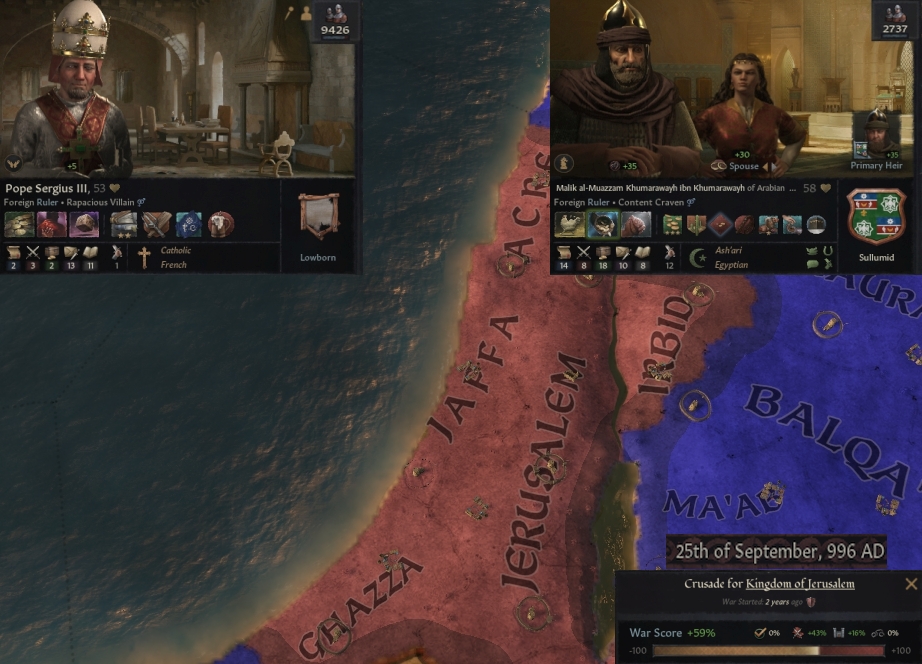
Friend, it was the Holy War of the Faithful you are speaking of, is it not? But how could you hear of its tale, so far beyond the sea?
It is pathetic to waste the questions for such, Rhomaios, for I do have scouts and messengers, seers and listeners, spies and traders, wanderers and tale-bringers, just as you, struggling to bring any sound, any word, any tale from one sea to the other at the end of the world. I will answer my question for you, for it was the priest-king of Rome, screaming his cry, calling for all followers of your Iesous-tengri, for the might of your God, for the glory of their realm, and they marched to the sacred city of yours, of your people, of your God. His opponent was the high-king of Arabs, yet he could not muster even a couple of mingghans. Was it not, Rhomaios, were they not, was he not? Tell me, speak true!
They were… They were answering the call of faith… But Friend! What you say was the act of the schismatics, enemies of the true book, pretenders to our realm, for our Basileus, our Patriarch, our words were already fighting against them!
How could you persuade yourself, after hearing your own words, for it is amazing to me, Rhomaios.
I… I…
So be it. You were never a ruler, holding the might in your hands, leading the people to whatever ends your mind has. I tell you, Rhomaios, the words of wars are woven in the glorious tales, yet they are the lies of obvious. You can know it only when you ride with thousands against thousands, for they are fought with the opportunity of fortune, for they are the vile acts of kings and khans, Basileis and Khagans, for they are the harbingers of doom for all fallen on the battlefields, for all waiting their beloved ones from the battlefield. You are the ill-knowing, yours is the blind-mind, you have the eyes of unaware. Some of them do fight and prevail, they tell the tales for all to rule them all. Some of them do not want it, some cannot even fight, yet they still do find any tale for all to follow them, telling them the war comes for them. There are the others, riding into the wars with the blood in the eyes, and there are others, enjoying the screams of others as they fall on the battlefields. All of them are such, Rhomaios, none of them are your saviours, they will never be, we will never be, and I was never such.
Chinggis Khan Ariq was all of them Rhomaios, yet his was the brilliant of the mind, for his mind was in the vision determined, to rule them all, all breathing under the eternal sky. Unfortunate for you, his was the storm to soar in the eternal sky, and Rhomaios, fortunate for you, his was the world only known to him, never hearing about you, only until the very end of him. The world known to him was the steppes of Mongolia, the plains of Khitan, the mountains of Altais. He ruled the steppes, he conquered the plains, but the mountains were held, even though the high King Deryab was no more a threat. Remaining were Buyana Khanum of the Tuvans, and Kuchuguden Darqan of the Guchuguds, but Rhomaios, life cannot be drawn on the ground, beings cannot be shown as stones, wars cannot be fought by wishes and orders. Chinggis Khan Ariq knew it, for his was the sharpest mind to see it, by ordering six tümens he was able in only securing the trust of others following the words of Kublai Darqan. Yet Rhomaios, he also knew it, for his was the greatest mind to realise it, not all would follow him, not all could pass those peaks, not all were even able to survive the winters while fighting in the mountains. Only three tümens answered his call, but that was enough for him to hunt for Buyana Khanum.
I understand, Friend, now my mind grasps what you mean.
I hope you do, Rhomaios, but it is too late to recover my patience to you, for now I know how relentless is your mind. This does not matter, by the end of it, you will abide, but I cannot help you, for the tales will break you. A wish of arrogance, for the tales to be delivered to the coming days.
You do not need to be such, Friend. You are not the cruel mind as you see yourself. I will brave myself. I have the faith in My Lord. I will prevail.
You should look into the mirror, to see your mind and what it tells you about yourself, Rhomaios. Chinggis Khan Ariq did it, but his was the fearless mind, for he was the only Barga sibling, able in defying their father, while following him. When his age came, his was the fear, his was the love, thus was he able, thus could he understand, thus would he accept it. He rode with six tümens, arriving at the hills of Tuva with only three, for it was the choice of the brilliant mind.
I hesitate to ask, for I can presume how it fared, but… What happened in the war against the Tuvans, Friend?
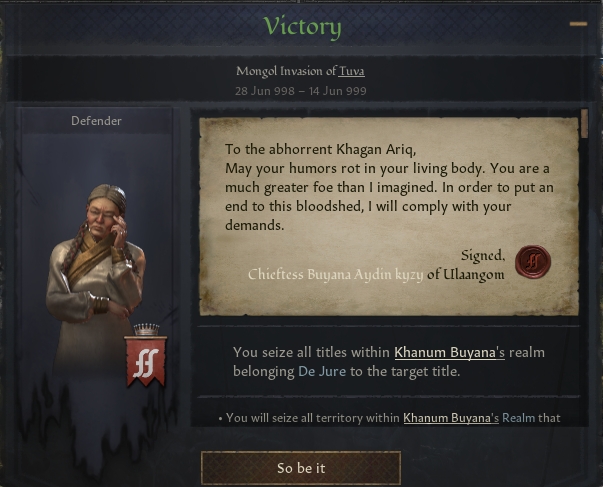
Did Chinggis Khan chase her after she retreated? Did he not resume to ride? Were there not the others, for he was never alone? Friend, what did the others say?
Your questions are pursuing the truth, Rhomaios. He did not resume, for it was the summer, the riders had to rest, and yet Chinggis Khan Ariq knew, it was not only the boons of the nature for him to ride with six tümens, yet not all of them but only three. The Seeker would never yield to prevent the misery spreading over ages, for she was the one to persuade others to hesitate. Yet there was the Kublai Darqan, able in building the castle of righteousness in his mind, making all to follow the path of his justice. It was never the justice, Rhomaios, for the blade cannot provide the fair rule, for the arrow cannot give the peaceful mind all beings strive for. They can only silence the words, they can only shatter the minds, they can only end the dreams. Despite the anger was shared, Chinggis Khan Ariq would know it, for it was their father already did it, and he achieved none but white doom to happen, he caused none but blue sun to dawn. Yet his son's was the mind with the vision, his son's was the right to rule all Rhomaios. Do you see it, Rhomaios, what Basileis and Khagans do, for they are able to know how others would follow them? No more words I can conjure to explain it, yet only the tales we have, only the names remain. It should not be as such, thus I removed them from the tales. It was not enough, Rhomaios, the misery I could not prevent. Even The Seeker could not do it, for it was the end of the wars she expected, yet riders from Kaytargan reached.
Who were they, Friend? What did they do, the riders you said?
They brought the words from Kaytargan steppes, Rhomaios, for they were led by Phongma the Bear, for she was the only one able to bring those ill tidings, the end of the tales, ushering the song of the storm never to end.
Friend, was that for… No…
I told you Rhomaios, I had to learn to count the stars but quickly, yet by myself for there was no one left to teach. Saran the Restless Heron would still help to ride, Phongma the Bear would still show how to fight, yet the stars I was also curious for, and I saw and I counted and I learnt their names, yet by myself.
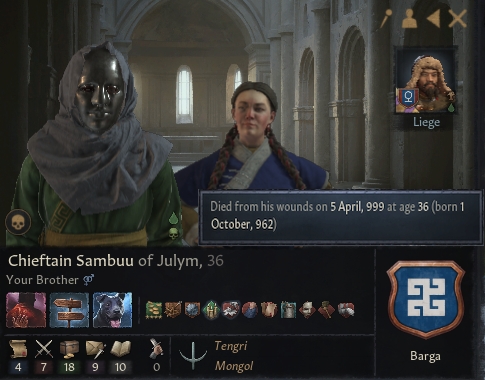
I am sorry for you are in the pain, Friend. I wish… I wish I could muster words to ease your suffering.
No, Rhomaios, you do not need to. Beware for whom you are feeling sorry. When Phongma reached the ordo of riders, bringing the family behind her, all were in the sorrow unable to speak, only she could mount off her horse. Ariq had received only the words of her departure, yet he awaited the band to arrive, only then he emerged from his yurt, thus did their eyes lock on each other. Her eyes were telling him to embrace the pain, but she saw in those eyes were the lightning. The Seeker reached there, but not before Kublai Darqan understanding the meaning of the silence. When he succumbed to his own remorse in the faraway corners of the mind, The Seeker was in the hurry, for she had to find Aldar, for she had to speak to him, for she had to prevent the horror to come, once he would hear the demise of his brother.
Did she succeed, Friend?
No, Rhomaios. Aldar Noyan the Tempest had already arrived from his morning ride, then he saw the arriving riders, then he saw Phongma Khatun mounting off but without any words, and then Rhomaios, he howled. Aldar Noyan, howling in madness, growling in pain, screaming in cries, calling for Tengri All-Sky: “Tengri be my witness, Tengri be my strength, Tengri be my guide! I will not sleep until I find, for the murderers of Sambuu will never ride!” The Seeker was too late, Rhomaios, she could not sooth the already crushing pain, for The Tempest was in the path of rage, none different but resembling their father.
But what did Chinggis Khan do, Friend?
He embraced her, for he needed the love of Phongma, yet she knew Rhomaios, this was not what he strove for, for he was the Khan of the Bargas, he was the Khagan of Mongolia, he was the storm never to cease until all bent their knees. She knew that, while the others were already preparing. The storm would soar, Rhomaios, and it did.
I do not know what I can say, how to use the words to ask, what to speak to understand. Friend, you said there was The Seeker, watching over them was her wisdom of the skies. There were the Bargas desiring the justice yet falling into the insanity of vengeance, else the followers of the tales by The Seeker, to heal and to live in peace, to close the wounds and to ride for peace in the coming days. How could they follow Chinggis Khan altogether? How could this happen?
Rhomaios, your mind is in the way of questioning, for it is not single yet many reasons behind any tale, for the words of the many make them, if they are ever to be heard. Not all would listen to the orders of the one true khan, not after the war against Buyana Khanum, for there were already many, following the words and the tales and the visions of The Seeker. Yet there were not only the Bargas, but the others, desiring the vengeance for their losses. It would be seen as the choice of the impossible, had it been any other khan, but it was Ariq, for he was Chinggis Khan. He retreated Rhomaios, ordering all to rest for the summer to the end, yet it was imminent, the storm to rise. “Prepare for the winter, for it will be the last for those hiding, riding, living in the Altais.” Thus could he gain the trust of Aldar Noyan, Rhomaios. He did not say any word other than those, for he knew The Seeker would scream the promises he had made, then many suns in the old. Yet it would be foolish to even think she would yield, thus he made his choice, Rhomaios.
What was the choice? Friend, what did he do?
He looked at his brother, Rhomaios, for he was seeing only the arrogant mind, faithful yet defiant, devoted yet rebellious, for Kublai Darqan would seek any opportunity to challenge his decisions. He would never abide by the words of The Seeker, and he would never respect those following her. Chinggis Khan Ariq walked towards his brother, and he hit him with all his anger, Rhomaios, in the anger he was for losing his brother Sambuu, blaming his brother Kublai.
But he was – you told me Friend, they were anda to each other!
Yes, and it was the undying bond between the two, yet Kublai Darqan would never yield under The Seeker, and his brother was not any other khan, Rhomaios, for he was Chinggis Khan Ariq with the eyes of lightning, looking at the unknown place, riding until the unknown day, living with the unknown mind. His was the vision to rule them all. Rhomaios, do you see it now, for he could make such a choice, and he could accept it as he would storm.
He was never… He never looked for the vengeance. He was not even riding for the justice. Those of him were only –
Words, Rhomaios, yes, only words and minds and visions for others, when one becomes the storm, formed by the winds of many, to rule them all. Tümens of riders, thousands of people. And Rhomaios, this was the lightning one could see in his eyes. Phongma could see it, and even before the war against Tuvans, she was certain of it, for she was the only one, able in mind, to persuade Tuyana the Moon Sable to ride until she could reach Maowün in the red of Gobi.
She did?!
Yes, Rhomaios, she was the one to seek the truth behind the demise of their sisters, and she did so after Phongma ordered her. “I do not need to hear your demands Phongma, for I will reach the lands of Thubet, to search for my nephews and nieces, to look for the villains, taking my sisters from me. Kün Ana will shine and Ay Ata will guide when I ride.” Those were the words of The Moon Sable, hunting behind the shadow-veil of the mind, defying the khatun yet never showing the disrespect. Phongma smiled with her feral eyes, Rhomaios, for she was The Bear: “Your words are fierce Tuyana, for one can feel the love for your kin in them, yet you are still here, standing before me trying to find clever words against me.” The sable in the dark was hunted by the words from the bear of the might, Rhomaios, thus did Tuyana ride hastily, in those words Kün Ana shined, Aya Ata guided.
What did she learn, did she learn the tale of their sisters? If she did succeed, then she must have – did Chinggis Khan know the truth, Friend?
Yes, Rhomaios, and more. Tuyana found a dying Ngapo, for she would lurk in the shadow, listen to the others behind fires, she could reach Tibet without ever being hunted by the marauders, for she was the one passing through the Gobi. She found Wangdak of the Ngawas, in his bed he was, in the dark awaiting his pains to end.
Why was he in pain, Friend?
“I was waiting for you, you must be one of those from the black of the Gobi, a kin to Byorte the Devil Warrior. I will not call the others, I will not deny, I will not oppose. I do know why you are here.” Those words were what Tuyana the Moon Sable heard, for he was Wangdak, the victorious Ngapo of Sungqu, yet he was in the old age, in the knowing to whom he was talking, despite without giving names. But his tale did not end by Tuyana, for he told her the reason of his pain, for he was in the days of old, he would not see many suns, his was the sorrow, for Byorte the Red Tiger was the able rival of him. His was the sorrow of regret, Rhomaios, for it was Wangdak of the Ngawas himself fought to avenge his kin for the crimes of the Bargas before their age, thus rode he to battle against Byorte of the Bargas, whereas his warriors could only take the life of her sister Bilduu of the Bargas. It did not end, but gave birth to more of it. Many moons later, then did she seek her own vengeance for Bilduu, and she took the life of his son, Rhomaios. When she rode to fight him, only then Wangdak was able to best his rival. But Rhomaios, he saw the meaning beyond the eyes of Byorte as she died by his blade, for it was the sorrowing eyes as his. He realised that moment, as he told Tuyana of the Bargas, when he defeated Byorte, the pain for his kin dying many suns even before him did not end, and worse, his son did not come back, for it was his own mind causing the demise of his son, his thirst was never satisfied yet he was devoured by it, his was the empty mind, never able to recover. It was not justice, for cold of blades, fire of arrows can never bring that, Rhomaios. So could Tuyana the Moon Sable learn the tales of Byorte and Bilduu, from the words of Ngapo Wangdak of Sungqu, and she left him in his bed, with the pitying eyes of the anger. She told that his cries were still resounding even after she left the stone yurt and rode into the shadows: “End it. Do not go away. No! Curses on you! Do not turn your back to me! NO! Do not leave me in this pain! End it now!”
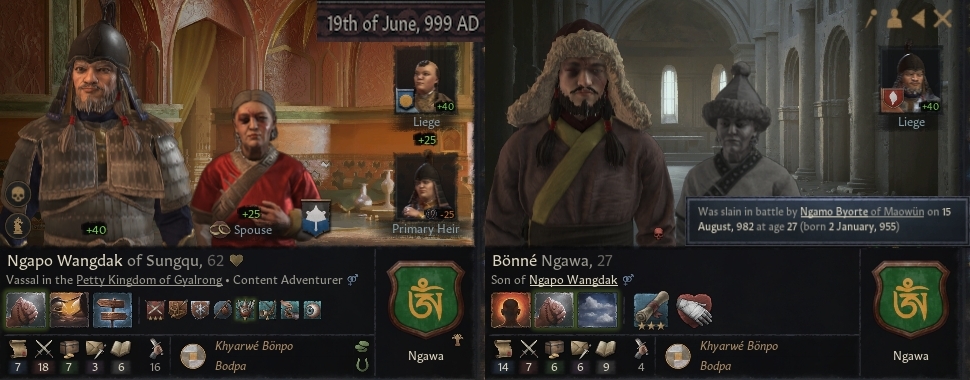
This tale is… I… Wait. Are you telling me…? If you are asking me... Friend, no!
Do not have any worry in your mind, Rhomaios, I do not have such wishes as that miserable mind, but I know your wishes, Rhomaios, I know you.
What mind do you think I have?
Sharper mind than the most, yet in the blind, even to yourself. You are hiding in such deep, yet it does not matter, Rhomaios, for I have to tell all the tales I remember, yet your questions, they cannot reach the turmoil left behind the storm. It was Tuyana the Moon Sable to learn the tale of their sisters, bringing it to the ordo of the Bargas. When Phongma delivered the tale of the pain, the sorrow behind the imminent doom, the agony it caused, it was Chinggis Khan Ariq listening those words. What he said flashed in the eyes of Phongma, even I remember how they resounded in my mind. “I will ride to the end, for I do not fear, in the storms I ride with the kut of Tengri All-Sky.” That moment was the end, Rhomaios, for Phongma saw what that storm could bring, and soaring with thunders, blasting with lightnings, and sweeping all on its path with its unforgiving wrath, it would include the children, despite the promises made. However, Rhomaios, it was already too late, for Chinggis Khan Ariq rode to Tuva, fought, and defeated Buyana Khanum. Then the demise of his brother Sambuu was heard, yet he still chose to ride, by his side was Aldar Noyan the Tempest, but allowing the wisdom of The Seeker to guide his mind. All he needed to show it, and he did it by beating his brother Kublai Darqan, in front of every other, while all were watching. It was the fight between the Darqan and the Khagan, yet it was between the two brothers of the Bargas, no one could dare to interfere. When Kublai fell on the ground, unable to open his eyes, incapable to even stand, yet still breathing, spurting blood, he screamed: “Run now, Ariq my brother, run from the pain of deaths, of your sisters and brother! I did not cause their death, but the ones who took them from us are still riding!”
Friend, what did happen then, what did Chinggis Khan do after hearing those words of Kublai Darqan?
He ordered his brother to return to Buryatia, and to never ride again, to never see him again, to never send him words again. For the minds of others, Chinggis Khan Ariq silenced the raving words of the Bargas, those of Kublai Darqan, yet the one true khan was still riding with the tümens, thus was he accepted as the wisest, Rhomaios.
To rule all, one should listen all, and know what they want. I do understand, Friend.
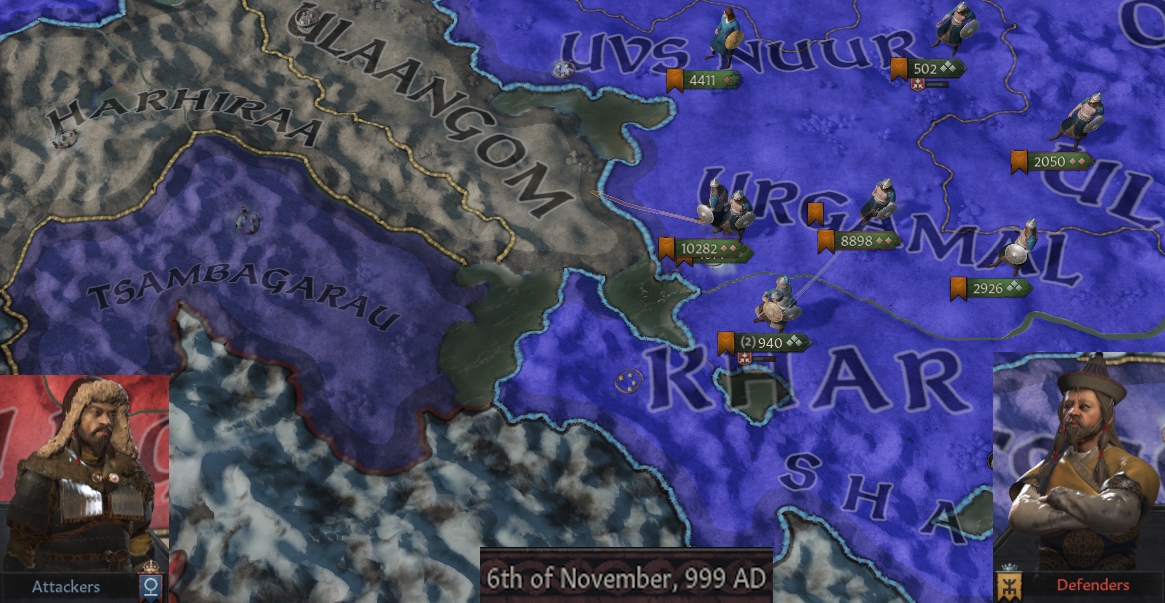
Did Kublai Darqan return to Buryat lands, Friend? What did he do, while Chinggis Khan riding without ever resting? What did the other Bargas do?
He could only recover from his wounds, but the wound of the mind makes one bitter than ever before, for it does not heal as fast. He never rode for his brother again, he never saw his brother again, he never sent his brother a word again. And yes, Rhomaios, Chinggis Khan Ariq rode to reach the dawn of Kün Ana, rode to touch the light of Ay Ata. When the words for the demise of Sambuu Noyan reached Altana Noyan, she succumbed to silence, never to speak, but ever to support her brother the one true khan. Temyulen the Black Tiger was not even told of the words, until the end of her days she struggled while remembering her sisters. Yet Rhomaios, the ordo of the Bargas was divided, for it was now Phongma the Bear, riding with them Tuyana the Moon Sable, along with Saran the Restless Heron guarding the children, leading them but away from the wars, away from the storm, away from the vision of Chinggis Khan Ariq.
By the side of Chinggis Khan Ariq, Aldar Noyan the Tempest was, and they were watched by The Seeker, for she was the reason of the tales, to bind them all, to bring the peace over the horrors of the old, to prevent them ever to happen again. When the battles over Altais proved the might of Kuchuguden Darqan, the riders of The Eternal Blue retreated, yet proclaimed dominance over their side of the mountains. When the black ends of the Uls was threatened, Chinggis Khan Ariq rode as a thunder of Ülgen, reaching the lands of Sibir, defeating King Nuyaksha of the Bardakis. When the remnants of the Kirghiz Khanate dared to threaten his vision again, he rode as a lightning from Ülgen, reaching beyond the red of Altais, crushing the warriors of Odeg Darqan of the Kalyuks. The wars never ended, Rhomaios, the Bargas never realised what they were in, for one cannot see it while riding the storm causing it. The turmoil they were in, and to this day as we speak, no one knows how the only light fainted, when the pillars of the earth were shaken, when the serenity of words left them.
The Seeker!
Yes, Rhomaios. It was the thousand and sixth age of your Lord, and she was nowhere to be seen, nowhere to be found, nowhere to be called, without any sound, without any word, without any tale, she was no more. I remember, I remember all of them, but her last words I remember the most. “Have no worries in the age of the struggle, for one has to keep the mind determined, young one. Never forget the power of the words coming from the tales, and never lose yourself in the tales of the old, for they cast the blind-eye with their glory. Never forget, they are told only to show the past, and should you choose, they become the words of the wise, for they hold the truth behind the mistakes, allowing one never to repeat them.” Had you had the chance to ask, whether the age brings new and unknown mistakes one can fall into, what one should do, then Rhomaios, she would answer readily: “Have no worries in the age of mistakes, for the coming days bring fortune and curse together, young one. The fortunes will show one how to face the curses of the coming days, and new tales will be forged for the days beyond. Young one, should they wish it, all must have the fortune to know their tales, and all must have the fortune to deliver their tales for the coming days.”
Those were her words, and I remember them all. Yet the age of Chinggis Khan Ariq would rage in the storm, the wars would resume without any end, thus were they in the unknown, when The Seeker left them. Yet for a young mind in that age, I persuaded myself in my own strength, for I was certain who was behind the mystery. I was young, and I was the ill-knowing.
Friend, who was it? Who fainted the light of the Bargas, leaving them without wisdom?
I knew it, Rhomaios, but only for I was young. My mind is not in that certainty any more.
But, what are you saying, Friend? What did happen?
I told you, Rhomaios, the turmoil happened, and the harmony left the lands. The sun was blue, and it was the Bargas seeing the white doom in their minds. None could be accused, for the ordo of the riders was still in their campaign. The ordo of the Bargas was far from them yet in the Kaytargan steppes. The Seeker was last seen in the lands of Aldar Noyan, treating the ill in the steppes left behind, she told all she would ride into the black, to bring herbs and healers, then she was no more. When the words reached, telling The Seeker was not seen for moons, the Khishigs were sent, yet Achigh of the Borogchins and Dergun of the Hokhots could not find her. Chinggis Khan Ariq succumbed to sorrow, for the lightning in his eyes were of the darkness. Aldar Noyan was devastated, for the words were ominous, for there were more ill tidings from his lands. There the disease was spread, then to his own ordo, leaving no one alive but only his eldest son. A cursed disease, casting bloated wounds, spurting disgusting pus out of them, causing an agonising end for one.

I know this disease you speak of, Friend. The plague, for I have seen it through my journeys.
Yes Rhomaios, and the doom was there, in the minds of all, mourning and begging for mercy from tengris in the skies, in the seas, in the rivers, in the steppes, in the hills, in the mountains.
But how did rest of the Bargas survive, Friend? What did they do, for they were left without wisdom, as The Seeker was not found?
Your words assume the truth, Rhomaios, yes, the wisdom left them, for it was certain, The Seeker left to ride in the eternal sky. The disease took many lives, and the remaining Bargas were saved only by fortune. I struggled to understand how one can fight such a disease in my age, but I was not successful in my efforts. One can only try to escape from it, begging mercy from Tengri the Eternal Blue. Yet in the age of Chinggis Khan Ariq, it was the turmoil. I told you, the only light fainted, the storm prevailed.
And it roared, Rhomaios. The storm soared over the Karasorkaliqs of the Kipchaks in the Karkarali and Kazakh steppes, Karagas of the Kirghiz in the Qocho hills, Chigils of the Karluks in the Zhetysu rivers.

The storm blasted on the Blu of the Karluks, and their lands in Otrar would never recover from the horrors.

The storm swept Sevilay Darqan of the Tuzniqs in Kimek steppes, Begluk Khan of the Karasorkaliq in Kipchak plains, Baçman Darqan of the Chigils near Balkash sea of Karluks.

The storm of thunders and lightnings fell upon the Guchuguds of the Naimans, the end of Kuchuguden Darqan was the tale of agony and misery. Many saw their demise, and others mourn the fallen ones. All seen by the eyes of lightning, they were devoured by the storm, it was to roar never to cease.

When Phongma the Bear rode to see her beloved one more, but to face the storm, to call for the serenity, to demand the peace of the days, she brought all children with her, yet they were left away before the khagan and the khatun met.
But you know what happened when they met, do you not, Friend, for the curious ones cannot be restrained?
I was not a young child any more, but yes, Rhomaios, mine was the curious mind. Phongma stood before Ariq, seeing a man in his late suns, but his eyes were still in the lightning, yet darker than ever were. Phongma saw those eyes, and she did not halt, she did not hesitate, she did not even blink. “It will never end, will it?”
And Ariq looked at his woman, burning in the love for her, yet unable to speak of it, as if struggling to avoid saying them. His words were of the cold, Rhomaios, for the vision of the mind was stronger than the passion of the mind. “It is my rule, for all of them will follow.”
Those were his words, and they were out of the wisdom, then left in the many suns before. Phongma knew the meaning, and no one, not even the Khagan of Mongolia, not even tengris could challenge her. “Hear my words. They are my children. Mine!”

They looked at each other, without ever moving, for the longest moment. I do not know what words would follow those, yet my mind is certain, they remained without any words. I was caught by then, Rhomaios.
By whom, Friend? What happened after you were caught?
Tuyana, for she was to watch over the children in the shadows, Rhomaios. I was able in evading her for only such short moment, then she would reach where I was hiding. While she was dragging me to ours away from the ordo of the riders, I was silent. Before arriving, she asked: “What were you doing? Do you know what would happen if I was not the one but another to find you there?” But I was silent, Rhomaios, and she saw.
What did she see? What was it she saw, Friend?
When Phongma returned from Ariq, it was already the night, yet she gave the order to return, for we would ride in the dark. Saran learnt of my escape from Tuyana, and she embraced me, but she delivered the words of Tuyana to Phongma. Her brows were knitted, her eyes were worried, for she knew she could never trust her beloved, and she knew there had to be another path instead of the turmoil, of the storm, for it was to devour not only their foes, but every and each of all. She was trying to find it in that dark of the night, when Saran spoke to Phongma. Those words brought her mind from the darkness cast for the coming days, and she looked, and she saw it too.
But Friend? What are you speaking of, what was it they saw?
Tuyana saw the eyes of trust, greater than any other she ever received, thus she spoke of them to her sister Saran, for she would deliver the words to the khatun. After the words of her, Phongma looked at the cause of those words, Rhomaios. She saw the light for the coming days, just as Saran and Tuyana saw, emerging from the eyes, silent yet telling, the serenity of words had to return, new pillars to carry the earth had to be erected, the light to burn evermore had to be started.
...?
It was my eyes what they saw, Rhomaios. They saw the light in my eyes, in them the lightning yet again, but of my path for the coming days.
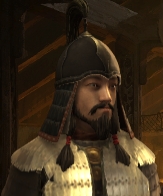
Note on the link my path: Zack Hemsey - The Way - from the album with the same name - 2011
Publishers-Edit 13.02.2023: Corrected major publication mistakes.
Last edited:
- 1
- 1
Book II, Vol.I - The Great Khan (Epilogue) - The Hope
Book II - Volume I - The Great Khan - Epilogue
The Hope
You were the one. You were there to help them finding the light. You salvaged them out of savagery.
You do know the words of The Seeker, Rhomaios.
I do not know them, nor the name, Friend, only in whispers, I was fortunate to hear, for mine is the curious mind too.
Yet you never used the curiosity for your own questions, but under the orders of others, you served your priests.
But Friend, they salvaged my soul, my mind is in the blessing of forgiveness.
And they serve your masters, your despots, your Basileis, yet you do not see it, else you do not want to. So be it.
You can achieve the salvation too, Friend. Why do you not see yourself in the benevolence? For yours is the magnificence, you led your people from the eternal doom of turmoil. You said six tümens, Friend. A horrifying might, in the hands of the wrath, all following the name of evil. In our age, they were never to be heard. Not even name of the Bargas, only fragments of tales by the fires, murmuring the names either The Bear, or the Shaman of the White, or the remnants of words from The Wise Karsak.
The Bear was able, for hers was to live and ride, yet she also protected and guided the children, preventing their minds falling before the blight. Even in the age of Chinggis Khan Ariq, she persuaded many of the riders to follow her, for hers was the vigilant mind. They followed her, at the end almost four tümens they were, and she guided us, the children. I never hesitated to follow her, yet I also never abandoned the side of Chinggis Khan Ariq. I was… the one both accepted, for I was to be above the sides. But Kün Ana bestows the light for all in the day, Ay Ata shines upon all in the night. Ours is not the only tale under the eternal sky. Many others were such, people of the other worlds heard many words and stories and tales, yet the wanderers and the traders and the bands and the caravans, their numbers were in the low by the significant. Your masters saw their world was changing too, for they were receiving less tales before their time. They sent the likes of you, for this was their ambition, theirs were the curious minds too, yet for their greed. It does not matter, for my age saw more people to walk the roads, cross the deserts, pass the mountains, bringing the tales from one sea to another. They trembled for what they heard, thus did they send more such as you. You never heard the Barga name, for all it was in the tales the dreadful fame, from those thus I removed the bane.
Friend, the others, how did their tales end?
Out of those you already know, I already told many of them, but one.
Kublai Darqan. Did he ever gain his courage to defy the rule of his brother? Did he ever oppose again Chinggis Khan?
No. He never left the mountains of Buryat, forever to be cursed rode his horse, for he could never dare to act against his own righteousness, he would never betray his bond by the blood, yet suffered in his mind. His and Chinggis Khan Ariq were andas, yet they became apart, after the losses and the fight. But I was young. I was drowned in my certainty. I let my fury blinding me.
What happened Friend? Did you…? What did you do?!
Kublai Darqan released his last breath, still in the bitter mind for his brother, yet he was looking at another one, for he was suffering and trembling and burning, with the bloated wounds spurting terrible pus. He was looking at me. I was there, when he was to have his last breath. I was there to see it, for I knew the disease would spread faster with the rodents. I was there to make it possible, for I had to ascertain his eyes to be closed forever.
No… No… What are saying Friend? No!
I was the one bringing the rodent into his ordo, for his meat to be poisoned, for him to eat it, for his was the crime, my mind was in the certain he was the reason for The Seeker to abandon us.
No, Friend, no! No one can bare the agony of taking a life, I do know it! Lord All-Mighty, I am praying for the soul of this one, please hear my voice –
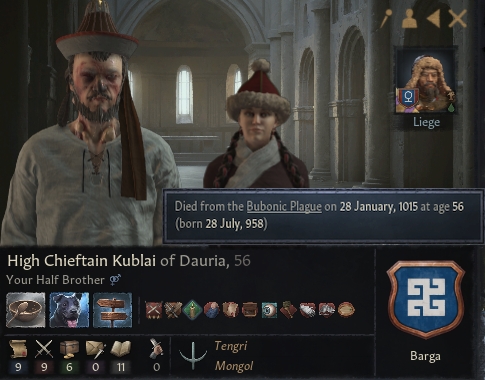
You said Phongma would never allow it, even though Chinggis Khan Ariq broke his promise to her, for the children had to follow the teachings of The Seeker, never to repeat the horrors of the old! Friend, you said it!
Yes, and I told you, for the children would forge their own paths. I never defied the tales left from The Seeker, and more, I made them the words to be followed by all. Thou shall not kill, neither kin nor other. Thou shall not rage against the ones with the different tengris, with the different minds, with the different habits. Thou shall not restrain the love to only two, for it is the mind for all. Thou shall not lay hands on the kin, thou shall not defy the words of the shamans. Many more I brought from the eternal sky to the pedestals, ordered them to be immortal on pillars, demanded them to be followed. Yet in the age of Chinggis Khan Ariq, those were only the words uttered by none but one, and she was The Seeker, but she abandoned the Bargas forever. The Bear, with her The Restless Heron and The Moon Sable, they guided my path, and I also remained by the side of Chinggis Khan Ariq, for I had to abide his rule while gathering all the might he had. Thousands perished by him, yet thousands followed him, and I was there, riding with him. The Bear never saw him, nor allowed him to approach her, not even could he see his children, had he wanted. It is for this reason, she remained in the steppes of Semey, in the white of Altais, away from the hearth on Borchigin lands.
When your Lord was of the age thousand and nineteen, the mind of Ariq Khan was in the ailing, and he already knew to whom he had to trust for leaving the storm, ever to soar under the eternal sky, but never to cease. Before his end was imminent, I rode with him to the steppes where his beloved stayed, away from him. In the last days of our ride, I had to carry him, for he was in the weak. I carried him, for his last days he wanted to be with his love, to look at her eyes, to ask for her acceptance. When we arrived, The Bear took him into her yurt, while looking at his eyes. His eyes were in the need of her, in the sorrow for being cast away from her, and her eyes were of the pity, for she never needed him, not once, and not any more. Forty riders trotted around his fire when his eyes closed many days later, but it would not be enough to forgive him in the eyes of The Bear. Yet his was the mind then in The Eternal Blue riding, his were the remains to be buried in the unknown mountains, watching over the unknown minds, for the unknown eternity.

But no, thousands perished before his last breath, and thousands perished after his age, for it was my age. I did not covet the lands of the others, but I told you, when a monster dies, another one is created, for it is the mind of Basileis and Khagans, to rule them all you lead the thousands to fight thousands more. I found other tales to claim, I found other lands to see, I found other worlds to include in our tale. You heard all of them, yet you were in the unknown, for the name of the Bargas was no more, it was Baigaljin for I ordered it to be the fame. All noyans, all darqans, all irgens, all harans, even khans you saw, you heard, you passed by, in those steppes, in those hills, in those mountains, their tales belong to us, for I rule them all. Do you understand it now?
Mother of Iesous Christos, please hear my voice, deliver it to Heavenly Father, in the name of the Holy spirit, I pray for this soul.
So be it. I told you thousands perished before my eyes, you kept your faith, out of all people, but for me. I told you I was the one taking the life of Kublai Darqan, as if an Erlik-wraith I heard his last words, even if he might have never done, of the crime I accused him in my mind, you kept your faith, still praying for my mind. I have told you thousands perished in my hands, in my age, and you still keep your faith.
But why? Why would my prayers not be accepted for you Friend? Your salvation I show to you, you already confessed all your sins, and the only need you should have is asking for forgiveness.
If you are trusting your words, I should reconsider my mind, for yours may not be the sharper mind. Yet I chose you, and I am sorry for you, for now I will leave you helpless, as the tale will break you.
Please Friend, you should see the light in the absolution.
No, I do not deserve that, but only suffering in pain I shall await. Yet, all I wish is you to listen to the tales I tell, for you to deliver them to the coming days. I was bestowed with the fortune of Umay, fourteen children were born in my name. I loved them all, I have the love in my mind for them all, yet mine was the ill-knowing mind then. You do know the names of the most, you do know what they do, for your words carried many of the tales to your masters. Look at the pile behind you, and you will see the heavy scroll, holding the words in it, they are our tales but in your words, and I heard the sounds of them all. They do not have the tale, for Todogen is the name, my beloved son, yet I am the worst nightmare for him. When he was young, he was mocked and ridiculed and cast away by the others, and I hated his misery, yet his was the joy of the day despite the others. I never despised his terrible face, I never despised his mediocre mind, I never despised his trembling on the horse. I have the love in my mind for him. He is my child. HE IS MY CHILD, DO YOU UNDERSTAND!
Yes, yes Friend, I understand.
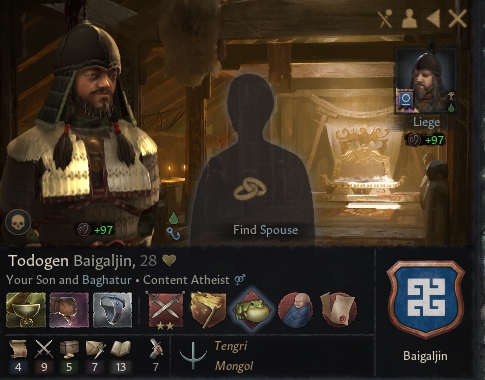
Heavenly Lord save my soul! I am praying for your mercy!
…and I choked his throat, in my hands was the struggling Todogen, looking at me, the questions one would see in his eyes…
No! You wouldn’t! NO!
…and his eyes were looking at me, and I realised the tears of mine falling on his face.
Heavenly Lord I beg you, please hear me, save this soul!
Spare me your faith of the irrelevant prayers. I do not deserve even those, but I was unable to end, for I was hit at the back of my head.
Thank you Iesous the Christos, thank you! Who, Friend? WHO? Who saved you from this damning sin?
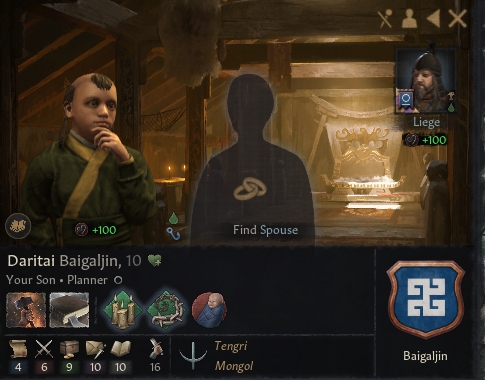
F – Friend, how could you do this? How could you?
Spare me your questions of the miserable, spare me your irrelevant prayers, for I do know what I am, and I am in the suffering, no gods in any name in any world can punish equally. Do you understand, I tried to take the life of my own, of my beloved child, of my blood!
I… I cannot even try. I do not know how you can be saved, Friend. I… I will… I will still pray for the mercy of God, for yours is truly the greatest suffering, and yet I cannot find words to define it.
Amazing. Sharp mind, and bold in the blindest. Yet I do know, I have been in the suffering, and I am, and I will forever be. None of my hopes succeed, for I do know what I am. However, my wish is you to listen to the tales I told, and you will deliver them to the coming days. Yet in this mind you cannot do it, for you are in the void, the darkness of the belief for saviours, yet thousands perish in the hands of those you have hope for, just as what I am. I have to question your mind, for the wish I have to try.
No, Please Friend, what you are trying to say, I do not know, I do not want to hear it, I will serve your wishes however you want.
I know you, Rhomaios.
Please Friend, no!
I know you want to take my life, I know you want to see my eyes closed forever, I know you want to end the life of this man you see.
No! No! NO!
Yet, you do not do it. Not for you have your faith, not for you repented your sins, not for your gods tell you otherwise.
Please! Speak no more!
You cannot do it, not for you have the absolution for your sins and following the path of your gods. You cannot do it, Rhomaios, for you know it, if you ever make any suspicious move, my baghaturs and my Khishigs and my servants, waiting they are in the shadows you do know, they would tear you apart, for you are hiding behind your absolution, for you are suppressing your rage behind the words of your gods, for you are shielding your wrath behind your faith. You know it too, for you are not only a keeper of words, you are not only a deliverer of tales, but a murderer you are.
NO! DAMN YOU OLD WRETCH! I HOPE YOU SUFFER FOREVER MORE! YOU CURSED ILL-BRED! YOU MINDLESS SHIT! CURSES ON YOU! I HOPE YOU SCREAM WHEN YOU SUFFER YOUR LAST BREATH!
Spare me your cursed words, Rhomaios.
Why would you… How could you take my… I was saved… I was absolved of this mind!...
Clean your face, dash away your tears, calm your mind, Rhomaios. When one looks at the mirror, it shows the eyes of one, thus we always fear of it. I did look at myself, Rhomaios. What I see was… Let your mind see it, your eyes grasp it, your ears hear it, Rhomaios. I am a monster.
Why… Why would you…
I have always been, I am always, I will always be a monster. Not benevolent, not magnificent, not kind, and yet the mightiest storm ever can be. Rhomaios, this is the smile you see on the faces of Basileis and Khagans, and behind those merciful smiles, thousands lay on the ground, without breathing, their tales never be heard, for we are all monsters, ruling over the others. Never were, never are, never will be saviours, and my wish is this, Rhomaios.
I would never want to... take... your life... Why did you choose me? Why did you tell your tales from your filth of mind? I will never surrender my faith, I will never yield!
Keep your faith, but to yourself, for you will need it, Rhomaios. Not for the saviour never be, but the saviours ever could be, for the people can follow the minds of doom, yet they should for once have the chance to decide what they need to do.
What… What are you talking about?!
I told you, Rhomaios. All tales I had to tell. You can keep the scrolls of your words too, take them from the pile. You have listened to my words, and others will be ordered for bringing those words on the scrolls too, yet not for you, but you will still have the words of the tales in your mind, for that is what you are. Then my Khishig, he will come to you, and he will talk to you, and you will listen to him, and you will follow him, for he will lead you to a horse of the fastest.
You… You are telling me…
This is the farewell, Rhomaios.
But… But why? What was the point of torturing me, inflicting so much pain on my mind, harming my soul, breaking my core, why would you?
I already told you, Rhomaios, for all I wish is you to deliver the tales for the coming days. Chinggis Khan Ariq was the greatest khan ever be, for he was the storm never to cease, and he ruled the world. But Rhomaios, he ruled the world only known to him, to his kin, to his people. I was too, Rhomaios, a mighty khan, for I was the storm never to cease, and my storm roared greater than him, and I knew the other worlds more than him, yet I did not want to, for I saw what I am. Those were the fortunes and the curses for your people.
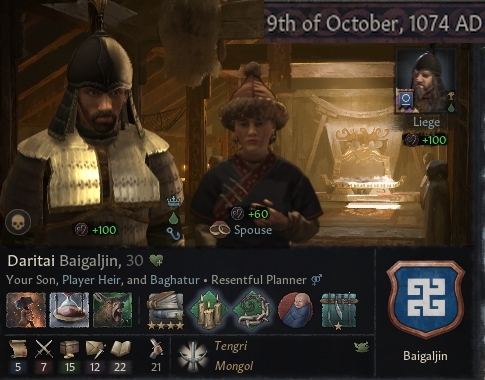
I… I cannot believe what I hear… You say… Daritai… Daritai will come… I cannot understand this. Friend! Why are you doing this?
For the hope, Rhomaios. The hope you are desperately in, and for the peoples of yours, of ours, of all, for I am not a saviour, no Khagan is, no Basileus is, but peoples can be, and they should have the hope. For I told you the tales I know they are the truth, and others will be ordered to hear your delivery, and they will make the words immortal.
F – Friend.
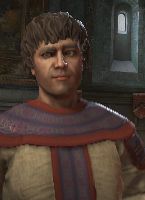

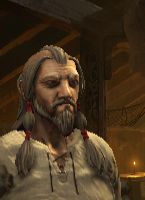
You will need all the fortune, Rhomaios,
for I never told you,
I never ordered you,
I never demanded from you,
in which path of hope,
for whom,
to whom,
you should deliver these tales.
Note on the link hope: Message to Bears - Hope - from the album Departures - 2009
Publishers'-Edit 13.02.2023: Corrected publication mistakes.
Last edited:
- 2
Thank you for the update. Do you mind explaining the mechanics behind the dynasty name change? May your holidays be happy and may your 2022 be better than any previous year.
It is simplified in the game as changing the name on the dynasty window (by clicking on the ink-feather icon next to the name), as well as changing the fantasy-fiction addition of the house motto (GoT effect). The only limit applied is that one has to be the dynasty head, and for the cadet branches, one has to be the house head. All name-changes are effective immediately, and unfortunately, they are applied also retroactively on the titles.Do you mind explaining the mechanics behind the dynasty name change?
The latter is unfortunate, as a coding choice by the developers of the game only for simplification, but this has a detrimental effect on the game. There are cultures and houses hard-locked to have dynastic names as the realm name. Of course this effects the name on the map; so as an example when the player forms mongol empire, it writes mongol empire on the map, but only until religious reformation and adopting feudalism. If the player realm undergoes such changes, then instead of the mongol empire, there will be [dynasty name] as the realm name on the map. Furthermore on the sorry situation, the title names change accordingly, and retroactively. One can find out where {duchy of kashgar} is by common geographical knowledge, but one cannot find out {duchy of [dynasty-or-house name]}, as said before, it changes accordingly, and retroactively (so all title history changes).
Of course this means, that when certain dynasties are played, after an according culture-change and adoption of feudalism, one can end up with an unbearable realm name on the map.
Needless to say, none of the name- or motto-changes have any effect on the gameplay but are provided only as flavour. The problem is, the game has so many other limitations that this addition remains only as a frivolous detail.
Another trivial detail is the ability to edit-change the house or dynasty coat-of-arms in the game, but that came later (patch 1.5), which was after the run of The Secret History of the Bargas. Would have readily change the default house arms of the Barga in the game had it been possible in the previous patches while playing the run, as the default symbol given to Barga makes one to close the eyes every time looking at it. No idea why that one is given as the default for Barga. Many more houses have some random symbols in the game; in the game only a couple of coat-of-arms for turkic, mongol, han dynasties have historical basis.
This subject is rather a long one, but will briefly write about it nevertheless. Brief, in the sense universal-filcat-o-metre.
The dynastic coat-of-arms is not as depicted in the game what it is perceived for nomadic cultures in reality. At first it has to be pointed, that the game makes the gross simplification of distinction of governments as tribal and feudal realms. Calling a realm, which is ruled by a king, a half-witted cousin as priest, a moronic marshal, and a couple of barons and dukes and some papal shenanigans; calling that a form of government is by itself a baseless assumption, a terrible simplification for the game design. On top of this false base, the design assumes a flow of from tribal to feudal for human societies-communities-populations-cultures, which can be regarded only as a rich fantasy. A better representation could be agrarian-sedentary societies as opposed to nomadic societies, yet without a hierarchy; eventually the agrarian-sedentary way of life prevails over nomadism, that is of course observed in the course of history, but this was not an upgrade of technology or innovation as depicted in these video games; both societies have certain advantages and disadvantages over each other, with the agrarian-sedentary ones having more stable outcomes in the long term, hence the term agricultural revolution, but against hunter-gatherer culture. In this case, the ruling class of the agrarian-sedentary requires symbolic banners to rally its subjects in order to fight the rivals.
On the other hand, the nomadic societies did not require such rallying efforts, because of their class structure: When every class of the society has the fighting-or-evading ability, then it becomes easier to assume viewing the entire population as warriors, even if this is also a gross simplification. Regardless of the assumption, it is reasonable to claim that there are no levies to conscript in nomadic societies as opposed to agrarian ones, which depend on them as the backbone of their armies (another anachronism, but keeping the name army for simplicity). The only rivalry within nomadic societies remains as the leadership for the population, which is similar to agrarian-sedentary ones. In this case, tuğ (for turkic cultures) or sulde (for mongol cultures) are seen as the banners for the war efforts to rally around a certain ruling tribe opposing another.
However, none of such banners can be strictly considered as coat-of-arms as given in the game; all such symbols depicted in any of ck2 (horse lords dlc; nomads) or ck3 (vanilla; tribal; mongol, turkic cultures, etc.) are actually called tamga (тамга in modern mongolian; damga in modern turkish; also root of word таможня customs-custom house in russian). They are used for the purposes of stamping-sealing the herd, to distinguish which herd belongs to what clan, also for taxation, trade, and coinage, etc., so it was a property mark [1]. The game assumes these symbols as the coat-of-arms for the houses, yet nomadic societies do not even abide this house system based on a castle in the middle of nowhere, such as the habsburgs (habsburg is a dirtpile castle in switzerland).
So, they are simplified assumptions in the game, at best.
A couple of examples [2]:
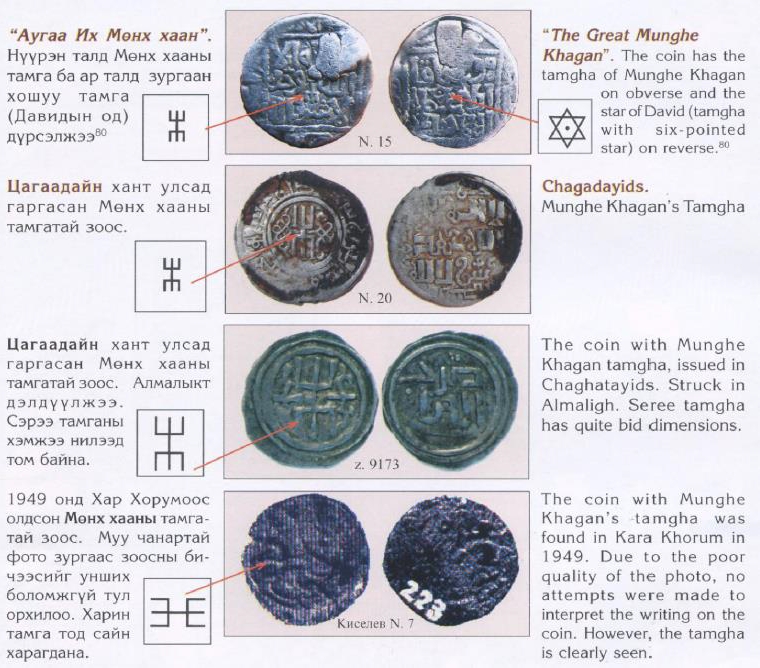

[1] Tamgha and The Struggle Against It: On The History of Medieval Turkic-Mongol Taxation System, R.Yu. Pochekaev Р.Ю. Почекаев, National Research University Higher School of Economics, St. Petersburg, 2014
[2] The Coins of Mongol Empire and Clan Tamgha of Khans (XIII–XIV), Badarchiĭn Ni͡amaa Бадарчийн Нямаа, 2005
Err... anyway; just as ck2, ck3 creates random characters as the run progresses; in ck3, some created characters are lowborn, and some of them come with a house (a dynasty with only one character). Not all of them are new names, so one can see many houses with the same name but with a different coat-of-arms in the same run.Do you mind explaining the mechanics behind the dynasty name change?
At that point of the game, the run had already created three or four different Barga houses; wanted to differentiate the dynasty of the player, thus changed it to Baigaljin (made up name; reconstructed old mongolian; roughly means a woman of/from Baikal, akin to mongoljin; a mongol woman).
The reasoning for the name change in The Secret History of the Bargas came later during the conception of the story (roughly after 15 June 2021, after deciding to write the AAR). As the story progresses (and already mentioned in this Vol.I of Book II), the name was changed finally one more time after Baigaljin.
Cheers, and best wishes for a happy new year!May your holidays be happy and may your 2022 be better than any previous year.
Edit 12.01.2022: Discarded a line, as the post does not recognise old turkic characters. Corrected grammatical and semantic mistakes. Corrected the last paragraph. Added the missing last part.
Last edited:
- 2
Finally managed to catch up. Good work as usual, @filcat. The epilogue for the Great Khan has a sense of finality, but does this finality spell the end of the line for the Secret History or only for that generation?
- 1
Sincerely grateful for the kind words; glad that it is enjoyed, despite the numerous grammatical errors the unwanted ones - still hunting them down. Cheers!Finally managed to catch up. Good work as usual, @filcat.
If the epilogue provides finality in the mind, then will consider this as another mission complete. Any interpretation of a reader is the greatest joy for a writer; this one makes the day of the writer; cheers!The epilogue for the Great Khan has a sense of finality, but does this finality spell the end of the line for the Secret History or only for that generation?
However, it is intended to emphasise a change on the regime of the power structure for the empire, rather than an end for the line of the dynasty.
The Friend recounts the history prior to his age in Volume I; towards the end of it, the Friend briefly mentions how his age begins after the previous age of Chinggis Khan Ariq. But the conversation takes place already at the end of his own age, thus the Friend warns the listener, the Rhomaios (the character names are still omitted), about what will happen after his own age. Therefore interpreting the epilogue with a sense of finality is highly valuable, as it is meant to be conclusive for both generations.
Not fond of giving any detail for what will be published next -so colloquially, not keen on spoilers- but will elaborate this one, as it is already made obvious:
Regardless of their structure and arrangement in publishing, the volumes follow a certain pattern as mentioned before; thus Volume II is about the Friend. The line of Barga continued, but with a different name, and Vol.II foreshadows another change. It is extremely enchanting to write as such, because as the writer, now the tools for writing about the future that has already happened, and then to foreshadow the future-beyond that is yet to happen are available.
- 1
Some CK2 v CK3 questions, if you do not mind. Can you change from realms, of some cultures, being named after dynasty and go with place name realms only? (This is my only change from default rule set.) In CK3, is the Genghis Khan dynasty always the Barga dynasty? In CK2, I have seen dynasties beside Borgijin (most games) for Genghis Khan. In my Avon run, the ruler identified as Genghis Khan is Agai Agai. In another game, a different founder dynasty of Mongol Empire, but first leader was never called Genghis Khan. Thank you for your time
The shortest answer is, yes, but presumably. It can be assumed that one can change culture and have a realm name that is familiar to the common geographic name in ck3.Can you change from realms, of some cultures, being named after dynasty and go with place name realms only? (This is my only change from default rule set.)
Quick example: The island of Sardinia, shared by two rulers of two different cultures.
West of the island is ruled by a Butr (part of berber culture group in the game); east of the island is ruled by a Sardinian (part of latin culture group in the game).
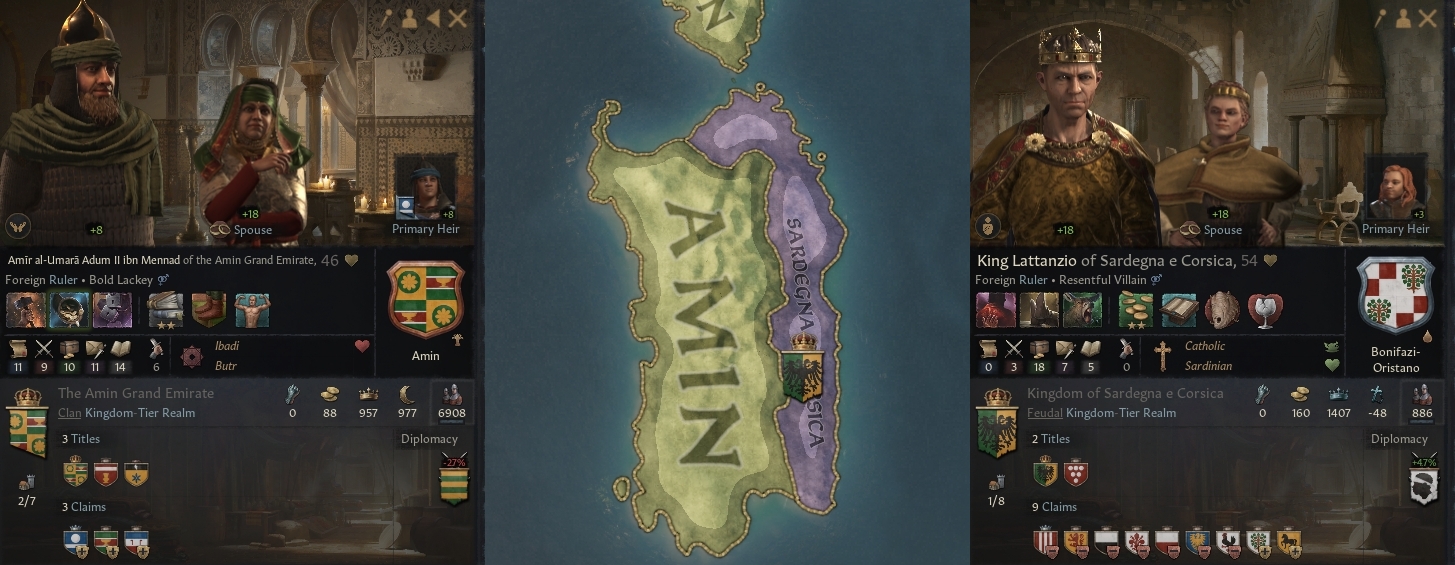
West coast is named by the dynasty of the ruler -Amin Grand Emirate- , east coast is named by the default de jure name of the island -Sardegna e Corsica-, but appropriated by the culture group, latin - it would have been, e.g. Sardinía kai Korsikí, had the ruler been greek, as defined in the game.
It is only an assumption, as there are more examples for different scenarios of succession and possession of titles, thus a precise answer is avoided. That can be given only after a careful examination of the code for naming algorithm of the game.
...and this opens the box of pandora, containing the names of the lands, and discussion on the dynamics of the names in the game.
That requires another post; will continue answering the rest of the questions for now. Suffice to say while being very fond of dynamic names, often it becomes difficult to find out what they refer to. The unfortunate side is the change is applied retroactively on title history. In few cases, the result is abhorrent for personal taste of course.
West of the island is ruled by a Butr (part of berber culture group in the game); east of the island is ruled by a Sardinian (part of latin culture group in the game).

West coast is named by the dynasty of the ruler -Amin Grand Emirate- , east coast is named by the default de jure name of the island -Sardegna e Corsica-, but appropriated by the culture group, latin - it would have been, e.g. Sardinía kai Korsikí, had the ruler been greek, as defined in the game.
It is only an assumption, as there are more examples for different scenarios of succession and possession of titles, thus a precise answer is avoided. That can be given only after a careful examination of the code for naming algorithm of the game.
...and this opens the box of pandora, containing the names of the lands, and discussion on the dynamics of the names in the game.
That requires another post; will continue answering the rest of the questions for now. Suffice to say while being very fond of dynamic names, often it becomes difficult to find out what they refer to. The unfortunate side is the change is applied retroactively on title history. In few cases, the result is abhorrent for personal taste of course.
No, not at all, as the genghis khan dynasty has nothing to do with dynasties in the game, but it is about the decision mechanic Become the Greatest of Khans, which makes the player ruler genghis khan, regardless of the starting dynasty.In CK3, is the Genghis Khan dynasty always the Barga dynasty?
There is Borjigin dynasty in 867 start of ck3 (a design choice of historical revision, with fictional yet slightly plausible basis), and the ruler is Bodonchar Munkhag, yet he is given the bastard trait; this forces the player to start a new dynasty as bastard-founder if he is chosen to play and have children. One can try to not having any children, but wait for the mother Alan Gua to have another child for succession, or straight go with Belgünütei or Begünütei as the successor (the other brothers are also given bastard traits), but all of this is too much and unnecessary effort only to have a borjigin dynasty to play. That is why preferred to play with another dynasty, and a weaker one; hence the Barga was chosen (the only tengri realm and ruler in buryatia in the game; others follow turumic faith - made up blanket name for ck3; after num-torum of khanty people [1] (ostyaks)).
[1] Khanty, People of the Taiga: Surviving the 20th Century, Andrew Wiget, Olga Balalaeva, University of Alaska Press, 2011
If the default game rules are kept, then regardless of the start date, around 12. or 13. centuries Chinggis Khan Temujin of the Borjigins arrives with his event troops, establishing the empire.
Then there is the bug, still not addressed despite numerous reports on it:
[1] Khanty, People of the Taiga: Surviving the 20th Century, Andrew Wiget, Olga Balalaeva, University of Alaska Press, 2011
If the default game rules are kept, then regardless of the start date, around 12. or 13. centuries Chinggis Khan Temujin of the Borjigins arrives with his event troops, establishing the empire.
Then there is the bug, still not addressed despite numerous reports on it:
- Even if the player starts with any date (867 or 1066), becomes genghis khan by decision, forming the empire, but while the default rule of mongol invasion is kept as it is; then even in that condition Chinggis Khan Temujin of the Borjigins arrives in the game; this time usurping the empire title of the player's mongol empire. The game continues but with all sorts of broken mechanics one can ever think of.
- That is why if anyone wants to play and form the empire by decision, then the mongol invasion rule must be turned off. This makes the achievements also off, but fortunately, have absolute zero interest for achievements or for ironman runs etc. as a personal preference. Never even played while online on steam, never; still playing as always while steam is offline.
Cannot vouch for ck2, as that chapter is closed for personal reasons, and it is for eternity. It was extremely fun to wait for horse lords dlc, and played the game only after that dlc; even if all other essential dlcs were available, never played with any tags other than the nomad cultures.In CK2, I have seen dynasties beside Borgijin (most games) for Genghis Khan. In my Avon run, the ruler identified as Genghis Khan is Agai Agai. In another game, a different founder dynasty of Mongol Empire, but first leader was never called Genghis Khan.
Needless to say it was a grandiose displeasure, a remorseful experience, an absolute disappointment. This sentiment is not even including the bugs it had; and those require not only a post but an entire thread for elaborating.
Regardless of this, still cannot remember what the available dynasties of nomads were in ck2; but the clan mechanic of ck2 provided always random names (albeit some resembled historical clan names); but there was the Become Genghis Khan decision mechanic, which allowed player to form the mongol empire. The usual problem of settling-going feudal or not was prominently there in ck2; this is slightly improved in ck3, but only slightly, as now the player of mongol empire (or any steppe-tribal realm) can access to the full scope of mechanics of the game, yet still only after adopting feudalism. A slight improvement.
Therefore it is difficult to predict what happens when the code forms mongol empire; if it is an early start, then presumably the code can take the decision, with any other dynasty, provided they fulfill the requirements. If the mongol invasion rule is set to historic, probably it will be spawned around 12.-13. centuries, but not certain about if it actually brings borjigins or any other dynasty. It is certainly a playable dynasty (and chinggis khan temujin of the borjigins as ruler) when the date is set for the mid-to-end of 12. century.
Also cannot comment on the name of Agai, as never heard of any tribe, nor clan, nor culture, nor dynasty with that name, and have no idea what it is. All names in the game, be it ck2 or ck3, are given in the language of the game as transliterations; so even Borjigin can be difficult to actually write; the turkic transliteration is as börçigin, while russian is Борджигин - bordjigin; french transliteration is bordjiguine; german transliteration is bordschigin; in modern mongolian it is written as Боржигин - borjigin, but that is mongolian cyrillic, so ж is ~⟨j⟩, instead of ⟨zh⟩; sounds as voiceless palato-alveolar sibilant affricate, t͡ʃ, as in chair.
Regardless of this, still cannot remember what the available dynasties of nomads were in ck2; but the clan mechanic of ck2 provided always random names (albeit some resembled historical clan names); but there was the Become Genghis Khan decision mechanic, which allowed player to form the mongol empire. The usual problem of settling-going feudal or not was prominently there in ck2; this is slightly improved in ck3, but only slightly, as now the player of mongol empire (or any steppe-tribal realm) can access to the full scope of mechanics of the game, yet still only after adopting feudalism. A slight improvement.
Therefore it is difficult to predict what happens when the code forms mongol empire; if it is an early start, then presumably the code can take the decision, with any other dynasty, provided they fulfill the requirements. If the mongol invasion rule is set to historic, probably it will be spawned around 12.-13. centuries, but not certain about if it actually brings borjigins or any other dynasty. It is certainly a playable dynasty (and chinggis khan temujin of the borjigins as ruler) when the date is set for the mid-to-end of 12. century.
Also cannot comment on the name of Agai, as never heard of any tribe, nor clan, nor culture, nor dynasty with that name, and have no idea what it is. All names in the game, be it ck2 or ck3, are given in the language of the game as transliterations; so even Borjigin can be difficult to actually write; the turkic transliteration is as börçigin, while russian is Борджигин - bordjigin; french transliteration is bordjiguine; german transliteration is bordschigin; in modern mongolian it is written as Боржигин - borjigin, but that is mongolian cyrillic, so ж is ~⟨j⟩, instead of ⟨zh⟩; sounds as voiceless palato-alveolar sibilant affricate, t͡ʃ, as in chair.
Edit 20/01/2022: Embedded the long explanation parts into spoiler tag to shorten the reply.
Last edited:
- 1
For the hope, Rhomaios. The hope you are desperately in, and for the peoples of yours, of ours, of all, for I am not a saviour, no Khagan is, no Basileus is, but peoples can be, and they should have the hope. For I told you the tales I know they are the truth, and others will be ordered to hear your delivery, and they will make the words immortal.
Icy shores of Lake of Riches,
Everlasting, ever-shifting blue,
Who knows if the cries which echo
Reach within your earshot?
Whispers of horses' hooves,
Of stirrups, saddles, sharpened spears,
The mourning of those fallen,
The lament of flute and matouqin,
Still echo beneath Eternal Heaven,
Borne upon each tameless breeze.
A Sky-Son sways to boundless horizon,
His every word obeyed at once,
Are there yet heights the storm can't sear?
Or depths of mind the storm can't plumb?
A truly superb ending to this arc, @filcat. Not resolving, never resolving, but bringing to a close this psychological-spiritual drama and lifting the veils upon the actors, leaving the reader perhaps with answers, but much more with questions and doubts. Like the Rhomaios, we too are gazing upon, not a resolution, not a coda, but a bridge to greater heights of heroism and tragedy.
It sounds like you will be continuing this AAR in perhaps another key, showing us what happens in the reign of the Friend and perhaps beyond it. Consider this reader eager to find out what happens next for this lineage of Baigaljin!
- 2
Can you change from realms, of some cultures, being named after dynasty and go with place name realms only? (This is my only change from default rule set.)
...and this opens the box of pandora, containing the names of the lands, and discussion on the dynamics of the names in the game.
That requires another post; will continue answering the rest of the questions for now. Suffice to say while being very fond of dynamic names, often it becomes difficult to find out what they refer to. The unfortunate side is the change is applied retroactively on title history. In few cases, the result is abhorrent for personal taste of course.
Back again, for more examples. As mentioned before, the question opens the box, and all the name-convention dynamics of ck3 erupt from it.
Part 1: In the beginning, there was order
First of all, some background on the game:
The reasons of inconsistencies are numerous; one other fundamental problem is the de jure county, duchy, kingdom, and empire system, which is a legacy design of the series inherited by ck3, and it supposedly is an abstraction for simplification. At this point, it cannot be changed at all unless the basis concept is redesigned; therefore not even going to write about it in details.
What is the relationship of this summary to the question, one may ask; well, the answer is again obliquely vague, yet includes the details briefly listed above.
First of all, some background on the game:
- The types of administrative structure of the realms are simplified into 3 (three) in the game: Feudal, Clan, Tribal.
- As expected banally, everything west of Danube river, and north of Pyrenees mountains is given as Feudal by default. That means, the christian realms start as Feudal. In addition, India subcontinent starts as Feudal, so the buddhist, the hindu, the jain, the taoist realms start as Feudal. At this point, it can be postulated that, Feudal type government (government. Leonhard Euler All Mighty. Shiiiiiiiiit. Yeah, right, government my navier-stokes equations. Whatever.) is not tied to religion.
- The unexpected one is Roman Empire; byzantine is also given Feudal, ans same hereditary succession as every other realm. But additionally, the greek culture is given primogeniture succession, so no partition due to succession (so the Makedon dynasty stays for good, if started in 867).
- As opposed to this, the muslim realms are specifically given as Clan type government (still not understanding the relationship of Clans and muslim realms as perceived by the game designers, but, yeah, whatever); so now have to make a correction to the previous postulate, as Feudal type government is tied to religion.
- The rest is Tribal. All of them, from Mali to Denmark, from Hungary to Mongolia, from Siberia to Tibet, all of them are Tribal. As a government. Whatever.And they are all following unreformed faiths; thus they cannot be Feudal or Clan until reformation or conversion.
- Well, a Tribal vassal of a Tribal liege can still adopt Feudalism when the Tribal Authority is at Level 4, without ever requiring faith reformation. Booom, another inconsistency.
The reasons of inconsistencies are numerous; one other fundamental problem is the de jure county, duchy, kingdom, and empire system, which is a legacy design of the series inherited by ck3, and it supposedly is an abstraction for simplification. At this point, it cannot be changed at all unless the basis concept is redesigned; therefore not even going to write about it in details.
What is the relationship of this summary to the question, one may ask; well, the answer is again obliquely vague, yet includes the details briefly listed above.
- Feudal realms use the default de jure names on the map.
- Clan realms use the dynastic names on the map.
- Tribal realms use the default de jure names on the map.
Part 2: ...and it lied, as the name of the order is chaos
If that is such simple as listed above, why there is a need of posting such a long answer, and furthermore, post over posts, one may wonder.
It is not such simple. Of course.
Case example, n.1
a- 867 start, historical character, Muhammad ibn Ali al-Armani (Muhammad son of Ali, The Armenian)
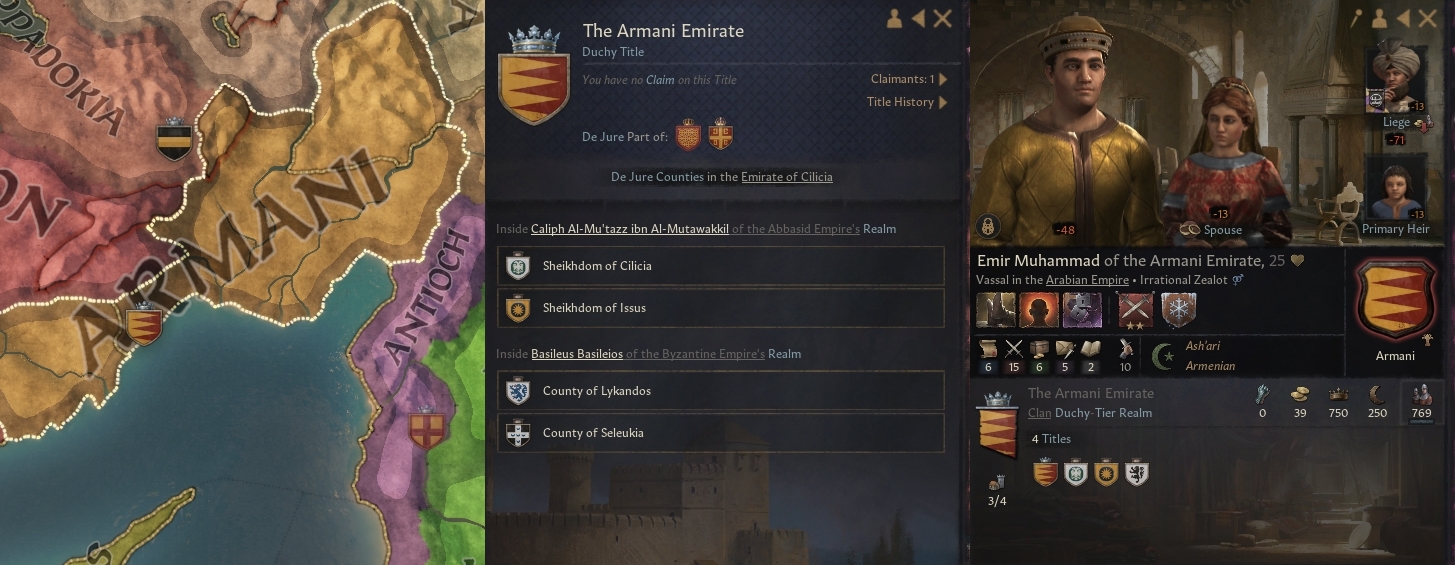
Do not g**gle Armani to search for the character. Lol.
Try al-Armani, or Muhammad ibn Ali of the Abbasid Caliphate, and prefer the computer at your local library instead.
So, this dude rules over what is de jure Cilicia, south of Anatolia, in 867 ce.
He is muslim, therefore his realm starts as Clan government.
He is armenian.
His realm is named after his dynasty, Armani.
Remembering the postulate from the previous post, that [some cultures are hard-coded to have dynastic names as realm names].
So it can be assumed at this point, [assumption a] that the armenian culture in the game uses dynastic names as the realm name.
b- 867 start, historical character, Ashot of Armenian Principalities (son of Smbat the Confessor)

Armenian Principalities, vassal of Abbasid Caliphate, 867, and it is a titular title.
Meaning it will never be a de jure title, as ck3 forbids de jure drift into titular titles,
even if the ck3-wiki says so, even if it was available in ck2. Lol.
Yes, the example is chosen for increased complexity. Nothing in the ck series is simple, not one bit at all.
So, this dude rules over a titular title, roughly de jure armenia, east of Anatolia, 867 ce.
He is christian, therefore his realm starts as Feudal government.
He is armenian.
His realm is NOT named after his dynasty, Bagrationi.
[assumption a] fails. Moreover, the postulate [some cultures are hard-coded to have dynastic names as realm names] also fails, and requires rebuttal.
New postulate: [some faiths are hard-coded to have dynastic names as realm names]
[assumption b]: armenian culture can have de jure or titular title names as realm names, when they are Feudal.
Case example, n.2
c- unknown date. Let the player grant a kingdom to a random character.
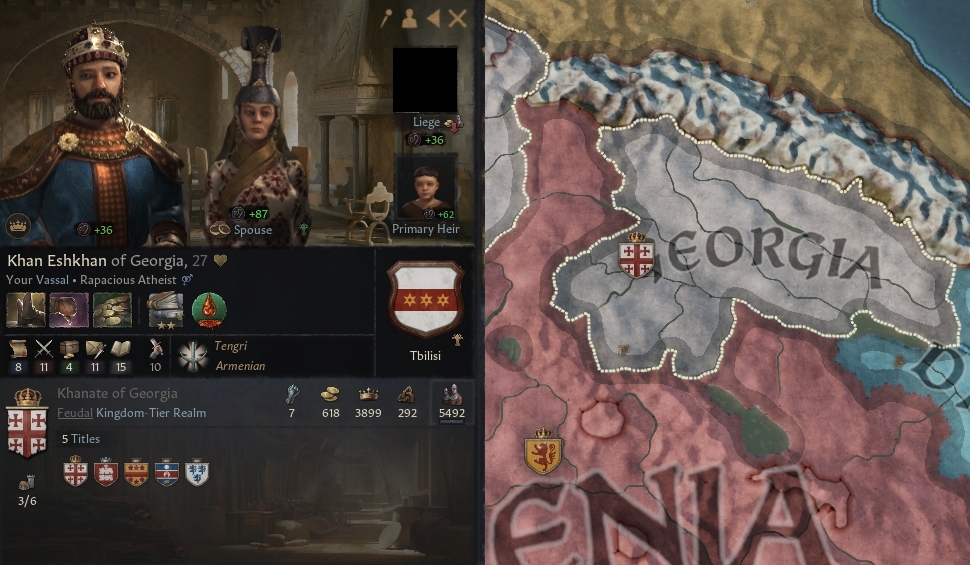
Don't bother wondering who the liege is. Lol.
So, this dude is granted what is de jure kingdom of georgia, east of Anatolia, south of Caucasus mountains, and some other lands associated but not seen in the screenshot.
He is reformed tengri, under a Feudal liege, so his realm is Feudal.
He is armenian.
His realm is NOT named after his dynasty, Tbilisi.
Even though [assumption b] holds, it is only specific to one culture, so too early to extrapolate it as a generalisation for all cultures. Besides, the postulate [some faiths are hard-coded to have dynastic names as realm names] failed, as apparently a faith that was once unreformed and later reformed does not affect it.
Another small detail: As the faith of the ruler is tengri, so unreformed-but-later-reformed, yet steppe faith, the naming convention changes from Kingdom to Khanate. Neat.
Perhaps, it can be tied to the liege? New postulate: [As the liege is Feudal, so must be the vassal, therefore de jure name for the realm]
d- Some years later after the unknown date. Succession happens. Life goes on.

Life really goes on. This is what happens when one does not have eligible heirs;
a distant nephew knocks the door of the castle. Lol.
So... Some successions later, Tbilisi dynasty loses the power, but another one emerges, Ruyan dynasty.
And the first of them is again tengri, under a Feudal liege, inherited a Feudal realm, so his realm is Feudal.
He is mongolian.
His realm is named after his dynasty, Ruyan.
Check the image on the right; that is taken many years later after the succession.
That dude completed his life by converting from his culture, adopting the local armenian culture (at that point, armenian culture had already spread over the area).
BUT the realm name stayed as the same, after his dynasty, Ruyan.
Furthermore, that name change is applied retroactively; all title history now writes the Ruyan Khanate, instead of Khanate of Georgia.
The postulate: [As the liege is Feudal, so must be the vassal, therefore de jure name for the realm] completely fails. [assumption b] also collapses.
So, perhaps a new postulate? May be it is still based on faith of the character, the game designers made it such that only the muslim realms, which are hard-coded to have Clan government, will have dynastic names as the realm names? May be some other cultures after faith reformation are hard-coded too?
Case example, n.3
e- Unknown date. Random character, independent ruler. The other side of the map.
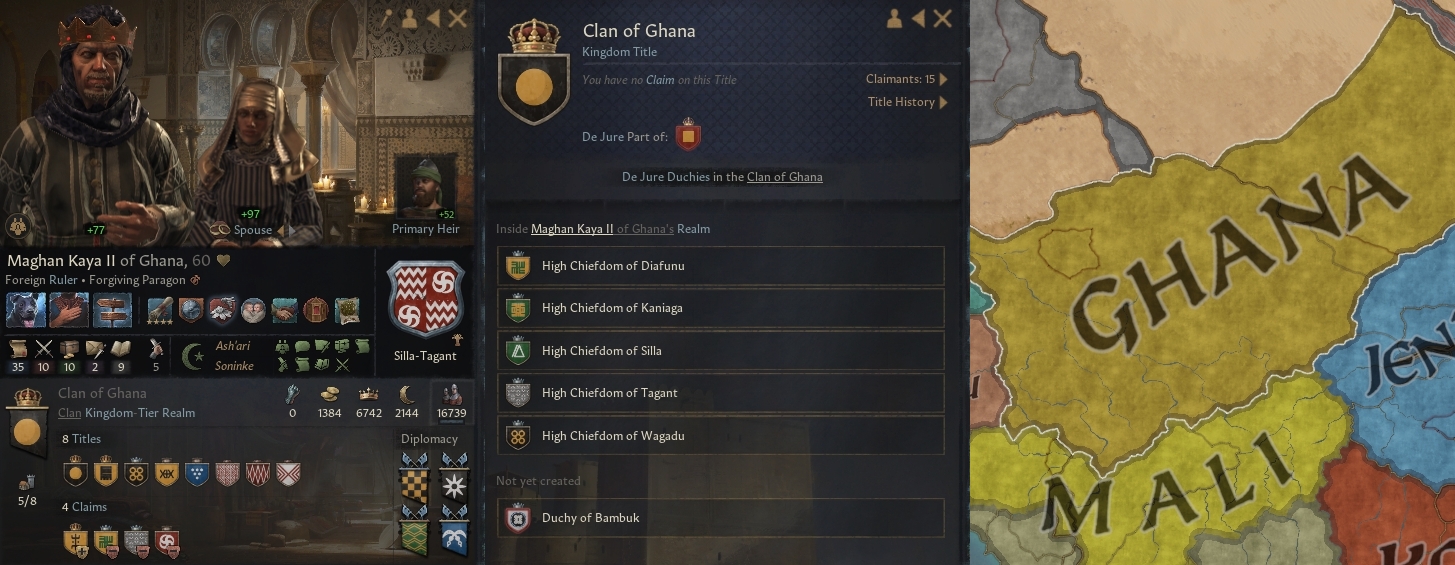
Welcome to west of Africa. It seems peaceful here.
So, this dude rules over Ghana. After some err... altercations with north of Africa, the muslim rulers prevailed.
He is muslim, therefore his realm has Clan government. Did not check if he converted and then adopted Clan government, or inherited as muslim and changed the realm to Clan.
He is soninke.
His realm is NOT named after his dynasty, Silla-Tagant.
Ghana is the de jure name of the realm.
No more postulates, as any attempt has failed.
If that is such simple as listed above, why there is a need of posting such a long answer, and furthermore, post over posts, one may wonder.
It is not such simple. Of course.
Case example, n.1
a- 867 start, historical character, Muhammad ibn Ali al-Armani (Muhammad son of Ali, The Armenian)

Do not g**gle Armani to search for the character. Lol.
Try al-Armani, or Muhammad ibn Ali of the Abbasid Caliphate, and prefer the computer at your local library instead.
So, this dude rules over what is de jure Cilicia, south of Anatolia, in 867 ce.
He is muslim, therefore his realm starts as Clan government.
He is armenian.
His realm is named after his dynasty, Armani.
Remembering the postulate from the previous post, that [some cultures are hard-coded to have dynastic names as realm names].
So it can be assumed at this point, [assumption a] that the armenian culture in the game uses dynastic names as the realm name.
b- 867 start, historical character, Ashot of Armenian Principalities (son of Smbat the Confessor)

Armenian Principalities, vassal of Abbasid Caliphate, 867, and it is a titular title.
Meaning it will never be a de jure title, as ck3 forbids de jure drift into titular titles,
even if the ck3-wiki says so, even if it was available in ck2. Lol.
Yes, the example is chosen for increased complexity. Nothing in the ck series is simple, not one bit at all.
So, this dude rules over a titular title, roughly de jure armenia, east of Anatolia, 867 ce.
He is christian, therefore his realm starts as Feudal government.
He is armenian.
His realm is NOT named after his dynasty, Bagrationi.
[assumption a] fails. Moreover, the postulate [some cultures are hard-coded to have dynastic names as realm names] also fails, and requires rebuttal.
New postulate: [some faiths are hard-coded to have dynastic names as realm names]
[assumption b]: armenian culture can have de jure or titular title names as realm names, when they are Feudal.
Case example, n.2
c- unknown date. Let the player grant a kingdom to a random character.

Don't bother wondering who the liege is. Lol.
So, this dude is granted what is de jure kingdom of georgia, east of Anatolia, south of Caucasus mountains, and some other lands associated but not seen in the screenshot.
He is reformed tengri, under a Feudal liege, so his realm is Feudal.
He is armenian.
His realm is NOT named after his dynasty, Tbilisi.
Even though [assumption b] holds, it is only specific to one culture, so too early to extrapolate it as a generalisation for all cultures. Besides, the postulate [some faiths are hard-coded to have dynastic names as realm names] failed, as apparently a faith that was once unreformed and later reformed does not affect it.
Another small detail: As the faith of the ruler is tengri, so unreformed-but-later-reformed, yet steppe faith, the naming convention changes from Kingdom to Khanate. Neat.
Perhaps, it can be tied to the liege? New postulate: [As the liege is Feudal, so must be the vassal, therefore de jure name for the realm]
d- Some years later after the unknown date. Succession happens. Life goes on.

Life really goes on. This is what happens when one does not have eligible heirs;
a distant nephew knocks the door of the castle. Lol.
So... Some successions later, Tbilisi dynasty loses the power, but another one emerges, Ruyan dynasty.
And the first of them is again tengri, under a Feudal liege, inherited a Feudal realm, so his realm is Feudal.
He is mongolian.
His realm is named after his dynasty, Ruyan.
Check the image on the right; that is taken many years later after the succession.
That dude completed his life by converting from his culture, adopting the local armenian culture (at that point, armenian culture had already spread over the area).
BUT the realm name stayed as the same, after his dynasty, Ruyan.
Furthermore, that name change is applied retroactively; all title history now writes the Ruyan Khanate, instead of Khanate of Georgia.
The postulate: [As the liege is Feudal, so must be the vassal, therefore de jure name for the realm] completely fails. [assumption b] also collapses.
So, perhaps a new postulate? May be it is still based on faith of the character, the game designers made it such that only the muslim realms, which are hard-coded to have Clan government, will have dynastic names as the realm names? May be some other cultures after faith reformation are hard-coded too?
Case example, n.3
e- Unknown date. Random character, independent ruler. The other side of the map.

Welcome to west of Africa. It seems peaceful here.
So, this dude rules over Ghana. After some err... altercations with north of Africa, the muslim rulers prevailed.
He is muslim, therefore his realm has Clan government. Did not check if he converted and then adopted Clan government, or inherited as muslim and changed the realm to Clan.
He is soninke.
His realm is NOT named after his dynasty, Silla-Tagant.
Ghana is the de jure name of the realm.
No more postulates, as any attempt has failed.
Part 3: ...but it does not matter.
After trying to understand the realm names change, and failing every time, have just quit thinking about it.
As mentioned before, while appreciating the dynamic names for the realms, it bothers when it comes to trying to understand how it works, as it becomes extremely convoluted with all the succession, conversion, conquest, reformation, inheritance, abdication, and wars of factions. These were not given in the above examples, and they really give a headache when one starts to question, but the problem is the inconsistencies as exemplified above. Not providing a clear in-game encyclopedia also pours gasoline on the fire.
Only a few times the names themselves really bothered, as some dynasties have such names that make one try really hard to continue. After failing so many times, the questions beyond emerge: What is a realm name? Why would it be bothersome to see lotharingia instead of frankia? It does give a couple of minutes of struggle to find out an absurdly named duchy in italy, but other than that, what is the difference of having de jure realm names? Often times, even they are not acceptable (annointed kingdom of romagna - errr, what??)
Then comes the soothing mind. It does not matter. When one voyages beyond Neptune, and looks back from a distance of ~6*10^9 km; no names, but it is only a pale blue dot [*] what one sees.
[*] Term coined by Carl Sagan, Pale Blue Dot: A Vision of the Human Future in Space, 1994
After trying to understand the realm names change, and failing every time, have just quit thinking about it.
As mentioned before, while appreciating the dynamic names for the realms, it bothers when it comes to trying to understand how it works, as it becomes extremely convoluted with all the succession, conversion, conquest, reformation, inheritance, abdication, and wars of factions. These were not given in the above examples, and they really give a headache when one starts to question, but the problem is the inconsistencies as exemplified above. Not providing a clear in-game encyclopedia also pours gasoline on the fire.
Only a few times the names themselves really bothered, as some dynasties have such names that make one try really hard to continue. After failing so many times, the questions beyond emerge: What is a realm name? Why would it be bothersome to see lotharingia instead of frankia? It does give a couple of minutes of struggle to find out an absurdly named duchy in italy, but other than that, what is the difference of having de jure realm names? Often times, even they are not acceptable (annointed kingdom of romagna - errr, what??)
Then comes the soothing mind. It does not matter. When one voyages beyond Neptune, and looks back from a distance of ~6*10^9 km; no names, but it is only a pale blue dot [*] what one sees.
[*] Term coined by Carl Sagan, Pale Blue Dot: A Vision of the Human Future in Space, 1994
Edit 20/01/2022: Embedded the long explanation parts into spoiler tag to shorten the reply.
Last edited:
- 1
Never have received a praise as great as this. If the ending leaves the taste as possible answers but causing more questions, then will regard this as the greatest compliment - and of course reveling in the joyous moment of mission complete [1]. Sincerely grateful for the comment.Not resolving, never resolving, but bringing to a close this psychological-spiritual drama and lifting the veils upon the actors, leaving the reader perhaps with answers, but much more with questions and doubts.
...then comes this. Wow.
Icy shores of Lake of Riches,
Everlasting, ever-shifting blue,
Who knows if the cries which echo
Reach within your earshot?
Whispers of horses' hooves,
Of stirrups, saddles, sharpened spears,
The mourning of those fallen,
The lament of flute and matouqin,
Still echo beneath Eternal Heaven,
Borne upon each tameless breeze.
A Sky-Son sways to boundless horizon,
His every word obeyed at once,
Are there yet heights the storm can't sear?
Or depths of mind the storm can't plumb?
[2] " “These three sons that she has borne, of
whom, of what clan, are they the sons?”
How can you speak so rashly?
When one understands that, the sign is clear:
They are the sons of Heaven [3].
How can you speak, comparing them
To ordinary black-{haired} [4] men?
When they become the rulers of all,
Then the common people will understand!
(...) You, my five sons, were born of one womb. If, like the five arrow-shafts just now, each of you keeps to himself, then, like those single arrow-shafts, anybody will easily break you. If, like the bound arrowshafts, you remain together and of one mind, how can anyone deal with you so easily? [5] "
[1] mission complete: Common phrase in english, but here quoted directly from Cannon Fodder, Sensible Software, 1993
[2] Quote from The Secret History of the Mongols: A Mongolian Epic Chronicle of the Thirteenth Century, by Igor de Rachewitz, Ch.1, p.4, {21}, The Australian National University, 2015; italics are additions to the text by Rachewitz; the quote is the answer of Alan Gua to his sons Belgünütei and Bügünetei, when the latter two question the legitimacy of their three younger brothers Buqu Qatagi, Buqatu Salji, and Bodončar Mungqaq
[3] Heaven, as The Eternal Blue, eternal sky, 'kök-tengri'
[4] Original translation in Rachewitz version is 'To ordinary black-headed men?', meaning man with black hair, indicating a commoner; used {haired} instead to avoid confusion.
[5] The metaphorical analogy to unity as multiple arrow shafts is common for many cultures; this is only one example as attested in TSHOTM.
- 2
Book II, Vol.II - The Historian (part 1)
Book II - Volume II - The Historian - I
“– What do you call to your acquaintances?
– Friend?
– Nökör? I like it. Yes. Now, you are different, I know you. You have come from the seas beyond.
– I... I have come from the great sea in the middle of the world, yes, F – Friend?
– That is better. Is that what you name your lands, the sea in the middle of the world? Are your people called sea dwellers?
– If that does not please you, your magnifice-
– My mind may be ailing, but I am still mighty, ready to fight when I am angry.
– Apologies, K- I meant, Friend. I was born in the lands of the Basileus. We are called Rhomaioi. Friend.”
“– What do you call to your acquaintances?
– Friend?
– Nökör? I like it. Yes. Now, you are different, I know you. You have come from the seas beyond.
– I... I have come from the great sea in the middle of the world, yes, F – Friend?
– That is better. Is that what you name your lands, the sea in the middle of the world? Are your people called sea dwellers?
– If that does not please you, your magnifice-
– My mind may be ailing, but I am still mighty, ready to fight when I am angry.
– Apologies, K- I meant, Friend. I was born in the lands of the Basileus. We are called Rhomaioi. Friend.”
έτος Κόσμου 6529
To My Bishop, Reverend And Divinely Favoured Heraklios, Demetrio of the Lowly Adorno Name Sends Greeting In The Lord
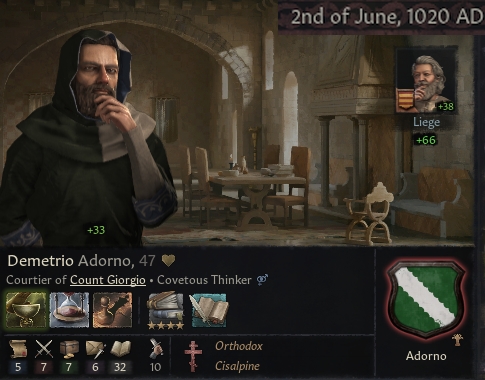
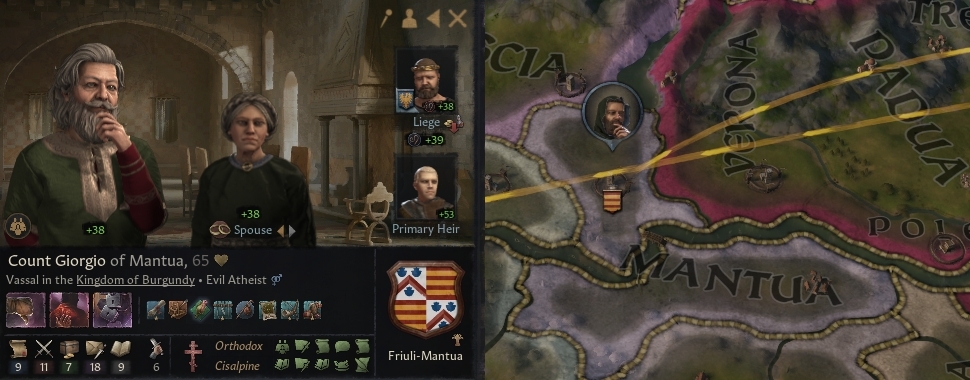
*
To My Dearest Friend, Heavenly Blessed With Great Mind and Eternally Cursed With Great Courage, I, Herakleios, Bishop of Kerts, In The Year Of The Universe Six-Thousand-Five-Hundred-Twenty-Nine, Send Greeting In The Lord
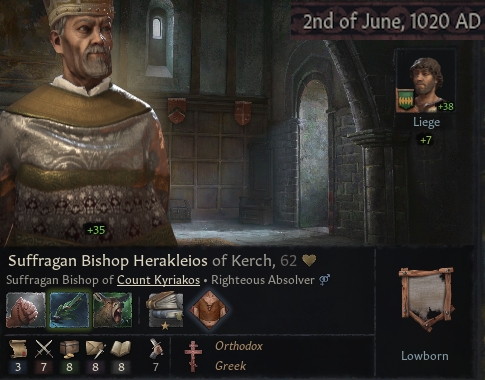
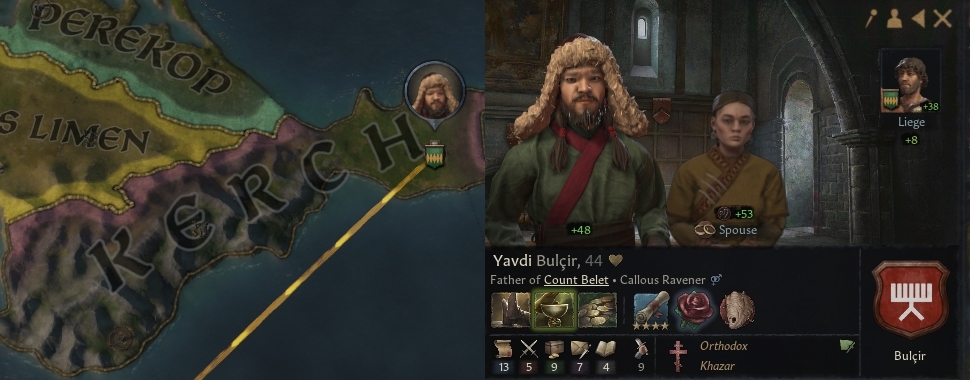
*
To My Bishop, Reverend And Divinely Favoured Heraklios, Demetrio of the Lowly Adorno Name Sends Greeting In The Lord
I have made the home I wished for, my dear friend. The city of Mantua is an image of Heaven, if Our Lord forgives me for the comparison. Conte Giorgio of the Friuli family is a man of coldest words known to his acquaintances, but he shares the passion of the mind in the questions I have. He is strong in the heart, because of his nature he resists to yield his allegiance to our Patriarch of Konstantinoupolis in the matters of the Schism, defying the words and the decrees of the Bishop of Rome.

Judging by the words of your trust, I shall provide all my knowledge newly acquired in my latest journeys throughout the ever-divided and never-recovered lands of Europa. The descendants of the pretender basileus of the name Karolidons still dominate and fight each other, for a vile ambition to have a throne of their own, yet the title still rightfully belongs to autokrator in Konstantinoupolis. It is pointless how unsuccessful they are, but they are yet to claim their ascendancy in the lands of Frankia, divided into east and west as if since the dawn of man in the times of Adam and Eve. Their claim is still based on the spurious words decreed by Bishop of Rome since the age of Károlos, yet their predicament is more miserable than ever before.
The east of the lands attracts more curiosity for my mind, because I made great findings, and that is once again by your assistance, my friend. Once in the times of Basileios the First, when he usurped the throne of Rhomaion by murdering Michail the Third of the Amoriou from Phrygia, the Makedons established their dominance in Basileia, abolishing the themata for their own greed on the throne. However my friend, I learnt from the merchants in Venetia, as they told me what they learnt through their journeys. In the lands of Kroumos the Fearsome, Kanas of Bulgaria, after his descendant Boris the First had found the glory in the path of Our Lord, there had been an invasion from further east into those lands of Pannonia. Theofanis the Confessor had named the lands around Kaspia as Tourkia, and these invaders escaped their rulers of that realm. Your assistance came at this point, my friend but unbeknownst to you. Your novice Giavdios of the Bolkiros has confirmed this to my knowledge, and he told me that those people call themselves Khazars. On the other hand, the invaders of Pannonia called themselves Magyars once they settled in the north of Tiras, beyond the mountains of Hunnic Alps of Sarmatici and Carpates. They claim the name of Arpad for their tribe, and this claim is a curios one. I recall the chronicles by Menandros Protiktor, as he noted the exchanges between Rhomaion and these people from five centuries in the past. From his words I remember a ruler named Sizabul, and your novice told me they were of the tribe Ashina. This tribe ruled the barbarian lands of Khazaria. Giavdios of the Bolkiros told me the tales of these people, as a rival tribe of the name Dulo rebelled against their overlords, escaping their rule to the north of Tiras. Their descendants assumed the name Arpad, and these tribes invaded the Bulgar Kingdom during the reign of Boris the First.

The great findings on the history of these people are not distractions to my main objection my friend. You still keep the wisdom, yet you confide yourself to the limits of the inner peace of the mind, however I will keep my position in defence of the questions for more. The curiosity of my mind cannot be satiated by the books of a single library, but only by the many. I will further claim, and it is my vanity as you may accuse me of, but during the reign of Basileios the First, the war with the Aghlabi sultans did not bring any peace for the merchants I talked with. The war was won, yes, a victory of Rhomaion against the Muslims, but Sultan Muhammad the Second of the Aghlabi returned to the throne of his realm mere years later. However, they had already lost their claim on the island of Sikelia with the successful campaigns by the Benevento families against them.
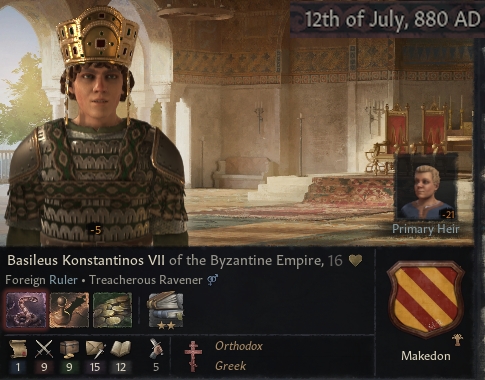


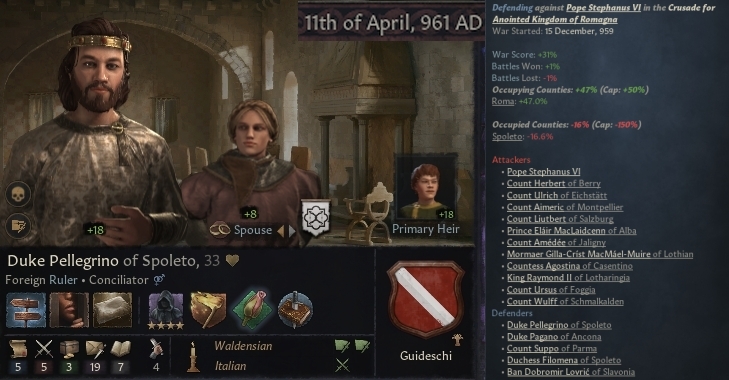

You may see my letter as the prudent words of a stubborn person, but the finding I have reached is hidden in these, reciting the history of our Basileia. I still defend my position in our discussion, my dearest friend. We do not live alone, whereas we are cursed with rulers assuming they are the Basileis of the entire world. The world resumes to live just as we do, and we pay the consequences of terrible deeds of our rulers in their own vanity. The greatest finding I have found is in the secrets the merchants of Venetia shared with me. Since hundreds of years passed, the losses of Basileia Rhomaion have affected them, for they are certain that their fortunes are diminishing due to this. Yet they had managed to establish contacts within the Caliphate, and their craft that they had mastered over the Mesógeios continued to thrive. Even the Holy War of the Faithful was beneficial for their cause in their eyes, however unholy and untruthful this may seem for the devout ones, but they have their place on the earth we live in.

However the situation may be, I will further my journeys and find new libraries, of books and of men from many origins, which was the starting point of our first discussion, my friend. I could not have stayed forever in the monasteries of Bosporos you oversee, nor in the holy churches of Konstantinoupolis the blind patriarchs roam, and never in the palaces and the mansions of the oblivious family of the Makedon rules. Despite your warnings, I will resume to question, to find the answers, and I will be ever happier to find even more questions to ask, so I can feel the grace of Heavenly God.
*
To My Dearest Friend, Heavenly Blessed With Great Mind and Eternally Cursed With Great Courage, I, Herakleios, Bishop of Kerts, In The Year Of The Universe Six-Thousand-Five-Hundred-Twenty-Nine, Send Greeting In The Lord
My friend, your words always shine upon what is dark of the day I have in the Bosporos. You may resent my insistence on staying in these lands, but the flock needs guidance, because the people deserve to know the true love of Our Lord. It is especially true when you accuse the rulers of the earthly riches for the misery we suffer, thus the Heavenly God must be heard more than ever.
Yet I do know you will never yield from saying what you learn, and I do know you will be on your way to feel the grace Our Lord through your studies. I will still be the Bishop of Kerts in Bosporos, yet I have the fortune of my faith, for Our Lord favours those who seek His guidance. I do also learn despite I do not much indulge travelling as you prefer, but the acquaintances of my novice Giavdios of the Bolkiros tell me that there have been great migrations from the lands beyond Kaspia, moving away from the routes towards Kafkasia, confirming what you have learnt from other travellers. These people, who were once following their barbarian faiths, they seek a safe haven for themselves and their beloved. I open the doors of the church, as Our Lord tells me, whereas this deed is seen as a naïve sentiment by many of the fellow priests and bishops, I sadly inform. Giavdios of the Bolkiros says the lands of Kerts are seen as a sacred destination for these people according to their customs from the times long before our age. They call it Karça, and they claim it was once under the rule of Kaganos of Khazars, yet of the name Bulan, descendants of Ashina tribe they claim. This I do know, as it was one of the last themata established. Church of Ioannis the Baptist, should you remember our discussions there, was actually built during those times and stood still despite the hardships it endured. Many refugees I accepted and provided for them personally, baptising many of them in that church for some time now. Many of these families shared with me similar concerns as you wrote, confirming the troubles in their lands they faced, yet left without details.
But my friend, you shall heed my advice, and be discreet on your studies, because the words are much sharper than the swords. They may incur the wrath of others more severe than the blood spilt on the grounds. I must warn you now, for it is the utmost priority for me to see your safety. Please reconsider your stance against the Makedon family, if you ever wish to come back, or even see Konstantinoupolis again. The recent conquests of Basileus Christophoros the Second bolstered his popularity in the court and among the nobles of the Basileia. I am afraid you may never find a patronage under these circumstances should you keep your opposing position against the House of Makedon. My greatest fear is if they ever want to silence such denigration. Please heed my advice, my dearest friend, and may journeys bring you the knowledge that you enjoy the most in this mortal life.
***
έτος Κόσμου 6547
έτος Κόσμου 6547
Gregorios, Strategos of Khachen, by the grace of God, to wise Germanos, Strategos of Antiocheia, his most kind greeting
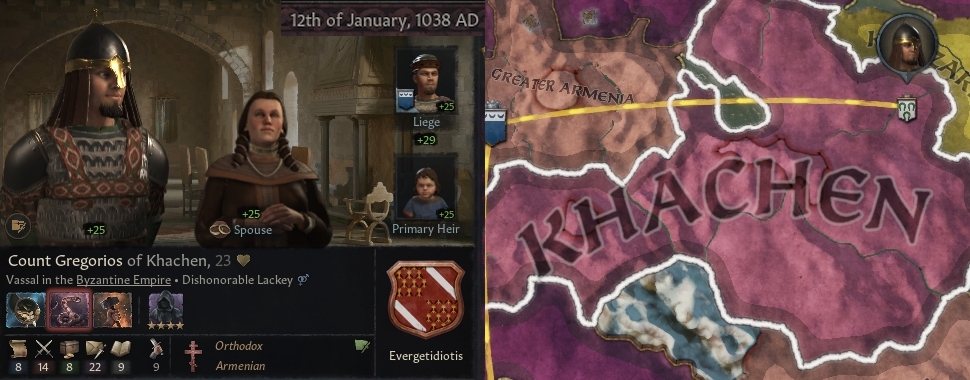
Bishop Matthaios urged me to discuss further on the subject later, that he had heard of such issues in the east causing many seeking refuge in the peace of Basileia. He had heard about the subject in one of the great synods he had attended in the past. The Bishop of Kerts had told him about the refugees. They were not escaping the Bulan tribes of the north, but unknown tribes.
*
Germanos, Strategos of Khachen, by the grace of God, to vigorous Gregarios, Strategos of Antiocheia, his most kind greeting
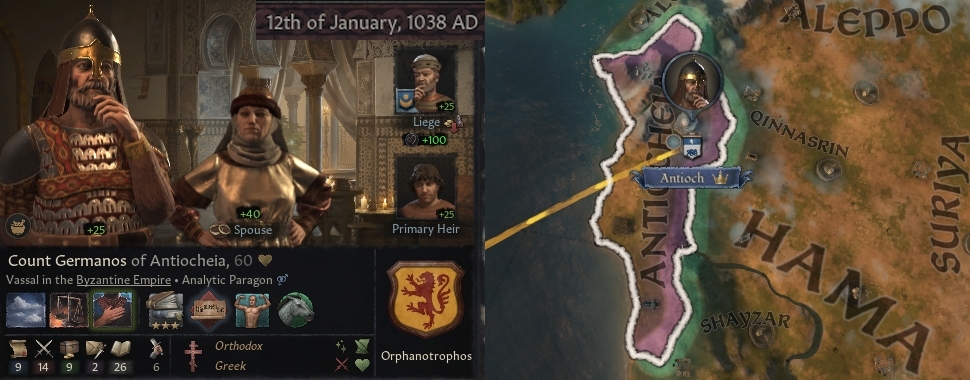
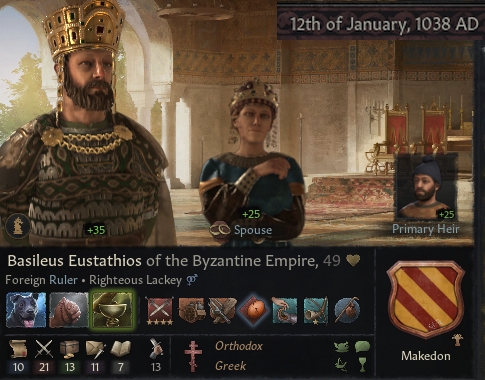
***
έτος Κόσμου 6558
To My Lord, Primus Inter Pares, His All-Holliness Ecumenical Patriarch, Archbishop Of Konstantinoupolis, Reverend And Divinely Favoured Ognen, I, Patriarch Stelian Of The Council Of Basileus Eusthatios Of The Makedon, In The Year Of The Universe Six-Thousand-Five-Hundred-Fifty-Eight, Send Greeting In The Lord
Your Excellence, Your Eminence, My Lord Archbishop, I send these words in regards to your recent orders under the wise counsel I have received in your sublime presence. It is true that Basileus Eusthatios is furious upon learning his despotis and doukai under his rule have all failed to secure a reliable inflow of knowledge from the lands far beyond in the east. It is true that we have learnt all knowledge currently we possess but only from the merchants of Venetia. Their words indicate that there had been a series of great wars in the lands far beyond in the east, and many of the great cities on the routes of silk and spice that we know from our old archives had fallen against a great threat. It is true that as this threat is far from our lands, the existence of it caused disruption on the trade routes that we all rely on, but to unprecedented ends. As I had modestly suggested before, the Venetiki cannot be trusted because of their allegiance to the pretender Bishop of Rome, therefore we should provide all the aid we can afford to have in the service of our Basileus Eusthatios, for the good of our Basileia and our people, by the grace of God All-Mighty.
I believe we can only succeed if we send a veteran traveller, knowing how to parse lands without showing true intentions to avoid unnecessary troubles and by the grace of God. I believe such a task is not suitable for envoys of the Church nor for the nobility to rely on. I have secured a confidential acquaintance by the help of fellow bishops in the council true to the Patriarchate of Konstantinoupolis. Archousa Georgia from Myra of Kibyrrhaiotai came forward when the call of the Patriarchate was heard. She proposed the services of a young man, currently residing in her court, but he came from the monastery in Tracias of Kappadokias. Archousa of Myra claims that this man in his early ages had once travelled in great distances with the Genovezoi traders and their acquaintances, and later he had become a guide for Venetiki and their contacts in the lands of Skythes. I do not doubt the words of Archousa Georgia, and I have already prepared his initiation in one of the episkopie in Vanand of Phasianoi. I am presenting this proposal for your consideration, Your Excellence, Your Eminence.
***
έτος Κόσμου 6560
To My Lord, Primus Inter Pares, His All-Holliness Ecumenical Patriarch, Archbishop Of Konstantinoupolis, Reverend And Divinely Favoured Ognen, I, Bishop Nikoloz Of Vanand, In The Year Of The Universe Six-Thousand-Five-Hundred-Sixty, Send Greeting In The Lord
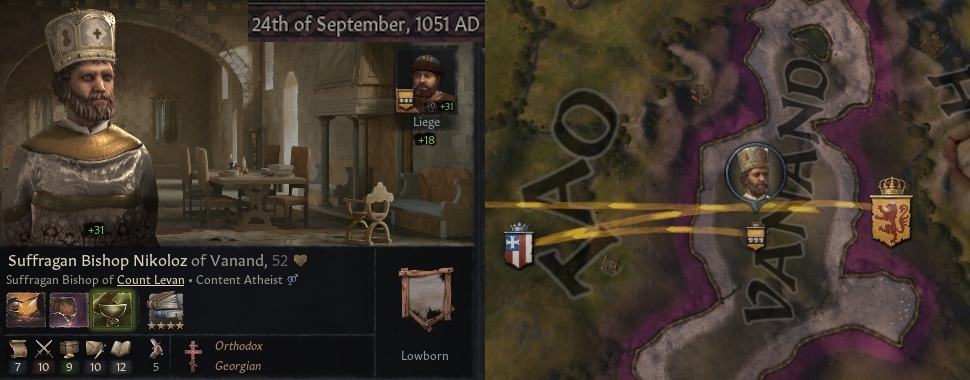
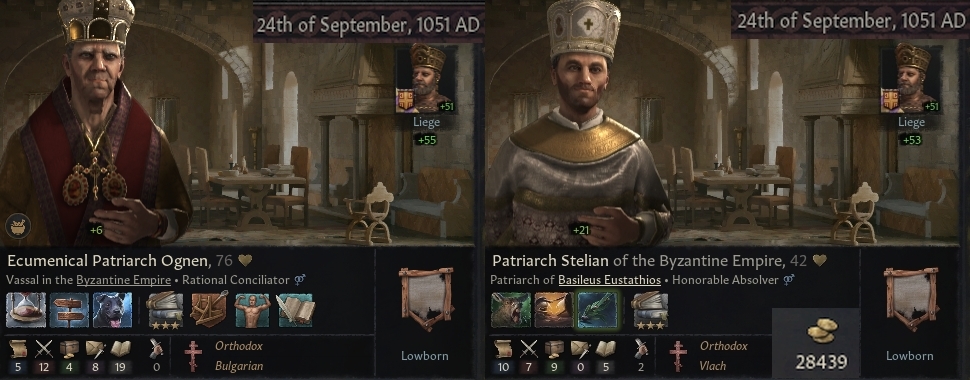
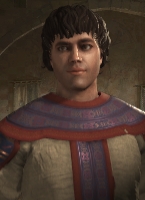
Publishers'-Edit 22.06.2023: Corrected publication mistakes. Correction on the format. Minor changes on the style of sub-section titles.
Last edited:
- 1
- 1
The epistolary format is a change of pace indeed! Not an unwelcome one, though. I see that it can be very little fit place for an inquiring mind or a person of mendicant habits to make a suitable home within the Basileia, however much the leaders both political and ecclesiastical might proclaim it otherwise. At least he has someone in Bishop Heraklios who at least appears concerned for his well-being, and here is hoping that that inquisitive spirit and patient study of the world do not come back to bite Demetrios Adornou in the behind. I find I'm already beginning to like him.
And then this... novice, of whom Bishop Nikoloz speaks in the end. His face does look quite familiar. A backstory here, perhaps?
Very well-written, @filcat - will be fascinated to read more!
And then this... novice, of whom Bishop Nikoloz speaks in the end. His face does look quite familiar. A backstory here, perhaps?
Very well-written, @filcat - will be fascinated to read more!
- 1
An example of two friends who are very much opposite in their ways of life, yet having deep respect for each other; and from the fourth wall perspective, another example of consequences for writing during summer, cornering self in the sentences, while being inspired (and almost stole from Narziss und Goldmund) to write it as a short-prologue, then suddenly realising that the side-characters filled a larger part in the story line than they ought to. Heh. Fortunately (and unfortunately, both for the writer and them) physiological limits for human-age remain realistic in the story, and the inquisitive spirit, add to curious mind; well... anyways, they were the perfect duo to distract the readAARs for opening with a warning to brave for a new age.At least he has someone in Bishop Heraklios who at least appears concerned for his well-being, and here is hoping that that inquisitive spirit and patient study of the world do not come back to bite Demetrios Adornou in the behind. I find I'm already beginning to like him.
And then this... novice, of whom Bishop Nikoloz speaks in the end. His face does look quite familiar. A backstory here, perhaps?
He looks familiar, doesn't he?
Edit: Corrected minor grammatical mistake.
Last edited:
- 2
Book II, Vol.II - The Historian (part 2)
Book II - Volume II - The Historian - II
“– Much better. I know you, Rhomaios. You had arrived in these lands thirty summers in the past. You have learnt our customs by now. You can speak, as you learnt.
– Yes, Friend. I have learnt your ways, your people’s knowledge was bestowed upon me. I came from the lands of Fulin, as your officers from Han lands taught me. I travelled to see the riches of the lands that were told in the tales beyond the Scythia, as far as Serica. I wanted to earn an honest livi –
– Do you know what we do here to the ones that lie, what we say here about the liars as they quickly die?
– Y-Yes, Friend.”
“– Much better. I know you, Rhomaios. You had arrived in these lands thirty summers in the past. You have learnt our customs by now. You can speak, as you learnt.
– Yes, Friend. I have learnt your ways, your people’s knowledge was bestowed upon me. I came from the lands of Fulin, as your officers from Han lands taught me. I travelled to see the riches of the lands that were told in the tales beyond the Scythia, as far as Serica. I wanted to earn an honest livi –
– Do you know what we do here to the ones that lie, what we say here about the liars as they quickly die?
– Y-Yes, Friend.”
έτος Κόσμου 6531
To Conte Giorgio of Mantua, I, Herakleios, Bishop of Kerts, In The Year Of The Universe Six-Thousand-Five-Hundred-Thirty-One, Send Greeting In The Lord
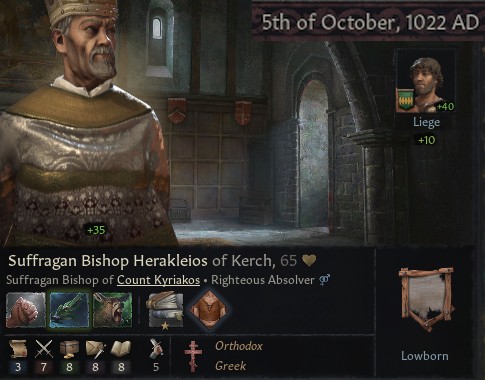
*
To My Bishop, Reverend And Divinely Favoured Heraklios, Demetrio of the Lowly Adorno Name Sends Greeting In The Lord
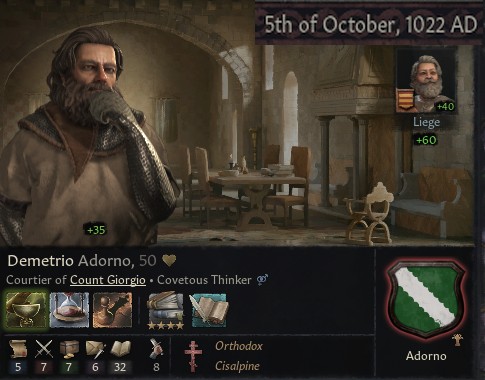
I am safe, my dear friend. The reason I can write only now, is none other than my being, my nature, my doings. I could not hold my words, for I was ever cursed with the curious questions, just you would say while smiling at me. It has been eleven months by now, and I was not in the position of questioning my situation, until I met the messenger in the shadows from Mantua.
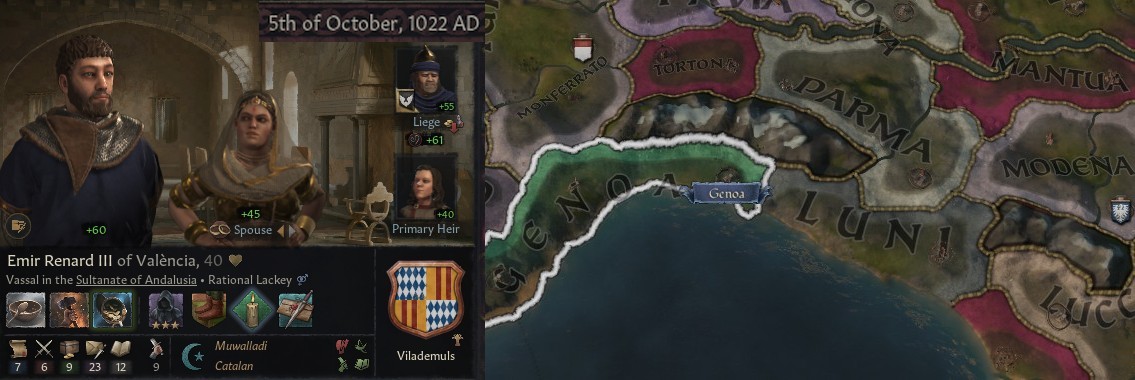
On the third night of their visit, I helped to facilitate the conversations as I was expected. I spoke about lighter matters I could muster from my humble knowledge, such that how Strábōn would call the realm of our guests the Land of Rabbits. They listened with great interest and joy and laughter, and to my much surprise, I was even tested about more of the passages from Geōgraphiká, by none other than Emir of Valénthia.
After such delightful exchanges, I made my mistake.
I asked about his family in the most respectful way, and he joyfully explained his parents, and his predecessors, and his ancestors, and his household. Vilademuls. I remembered that house name. I, and my ever cursed courage. I told Renard of the Vilademuls that his grandparents were born to their parents, but with a different ceremony. His great-grandparents were Christians, serving the Lord All-Mighty.
The conversation ended that night.
In the morning following that night, I was taken from my chambers, against my protest, against my will, against my wishes to speak with the Conte. Two days of riding I counted, but I must reconsider my memory on that account, as they covered my head with a hood, after I tried to resist fiercely. I was brought to a mansion, locked in a luxurious chamber. Although I was fed, provided well, and given even quills and ink and papers, it was clear I was a captive. Three days later I met with my abductors, men of Emir of Valénthia. They told me of the agreement between him and the Conte, and I was given to his servitude, as a payment to spare my life – and a good gesture for possible fortunes in the coming days between the cities of Genova and Mantua. Conte Giorgio betrayed my trust, and sold me as a captive, a ransom, a servant. I was furious, yet I could not do any other resisting than boasting harsh words of threats. All futile, yet I forced my throat to the limits of the voice I had; that was the only protest I could make. They informed me that I was to be sent as a guest to the court of the magnificent ruler. I could not understand what they meant, but I had to accept my fate. In the day after, I was escorted to board a galley, to follow the route from Genova to the island of Sikelia. The ship made its course to cross the beastly sea, reaching Afrikí. More than a week’s time passed while sailing by the calm winds, ramming through the monstrous waves, looking at the stars and the coast and the horizon, then we arrived in the great city, the jewel of the rivers, the beauty of the lands beyond.
I am safe, my dear friend. I am writing these from the other side of our sea, in a mansion with a view looking at the ports of Alexándria, under the direct servitude for, under the benevolent patronage of, under the magnificent reign of Malik al-Muazzam Walid ibn Mukhtar of the Sullums.

The messenger informed me that I will be able to write to you, and thus I will send all the words I can summon of the days at my new home, but regularly I can only hope.
*
To My Dearest Friend, Heavenly Blessed With Great Mind and Eternally Cursed With Great Courage, I, Herakleios, Bishop of Kerts, In The Year Of The Universe Six-Thousand-Five-Hundred-Thirty-One, Send Greeting In The Lord
After the words of this outrageous act I endured reading, I immediately sent mine in regretful anger to the Conte of Mantua, as well as my pleas to the Patriarchate of Alexándria. I will also write for any of the acquaintances I may have in the Holy Apostolic See of Mârkos. Even if we are opponents by the nature of Christos, I had good relations with them in the past, owing to my pilgrimages I was blessed with when I was merely a youngling. Rest assured my friend, for I will apply what little power I have to see your rescue.
*
To My Bishop, Reverend And Divinely Favoured Heraklios, Demetrio of the Lowly Adorno Name Sends Greeting In The Lord
I will forever be in your debt, my dear friend, yet it is now clear that it is unnecessary of you to seek my safety.
This is a land of wonders, my dear friend. I am alive and well and able to see these wonders of God All-Mighty, but only by His Blessing.
The messenger of the night revealed the truth behind the schemes of the Conte. A vile man now I see, but with great ambitions and supported by his cunning mind, Giorgios of Mantua is of the soul true to the Patriarch of Konstantinoupolis. The messenger assured me that I had acted exactly as the Conte had expected on that night in Mantua. It was by that act the Conte gained the trust of the Emir of Valénthia. Through this dastardly plan, they made an agreement of peace and other opportunities between their cities, and I was given to the servitude of the Emir as a gesture of good will. The Conte, on the other hand, had the privilege of knowing more than he had disclosed. Renard of the Vilademuls had been in the hopes of achieving good relations also with the court of the Sullums. In this delicate but fortunate calculation, the Conte had known that I would be sent as a gift to the Malik al-Muazzam. The messenger informed me that this is the vision of his master, for I to be the eyes and the ears and the words for the Conte in this court of Muslims.
And my friend, to my much surprise, this magnificent imperator of the vast lands in Aígyptos, he favours my presence, that I have been assured, by the words of others and by the treatment I have received so far. I am held with great respect among the other scholars of his court, in the name of Walid ibn Mukhtar of the Sullums. His court provides a safe haven and facilitates the gatherings and provides opportunities to many with the minds in passion of learning. The city of Alexándria is such beautiful just as you had spoken of to me years ago in the past, even though it may not be comparable to the overwhelming might of Konstantinoupolis. Yet the bustling ports and the ever-rich bazaars and the soothing tunes of the river and the lake, they do give the joy of life for those residing in the pearl of the sea. However, these charms are none in the eyes of mine, because I am amazed with the spell of another surprise I have encountered. The libraries of the Muslim imperator.
I am granted a mansion to carry on my studies, and I am strongly supported with multitudes of servants at my disposal, and I have the great fortune of meeting with great scholars from all corners of the world, I dare to say. But my friend, entirety of my mansion is none other than a library of scrolls, parchments, letters, manuscripts, books. And my friend, when I expressed my gratitude, the court servant laughed in delight, and he spoke, with the words that I am still dazzled by, and I do know you would be too: “This is only a small part of the collection of His Majesty.”
Even if I am grateful to God All-Mighty for the adventures of my life so far, I do know the lure of the fortunes I am currently enjoying, my friend, do not worry. Walid ibn Mukhtar of the Sullums has an unprecedented nature, as I have seen with my own eyes how he provides the riches and the justice in his reign. He invites and accepts all merchants regardless of their faith, but then he persecutes wrathfully those who forsake the fairness in their trade. He delegates his power over the justice in the realm, but this is only an illusion I can see through, as he does not refrain to challenge those who may defy his own vision. He swiftly ordered the execution of murderers on one day, and then he defied the decisions of the clergy of his own faith regarding a dispute among one of the noble families, by ruling against them without hesitation. The Imams and their leader wield great authority, yet they are not immune to the laws when their imperator intervenes as he deems. Besides the incomprehensible numbers of his household, he had established an ever-powerful reign by his strong will in great confidence of his words, for he personally accepts any envoy of any ruler from any land. Nevertheless, I must express my amazement for the Malik al-Muazzam, for his respect towards the scholars under his patronage.
Yes, my friend, I am in good company of many scholars and artists and men of words, under the protection of this Muslim imperator. I am not held against my will, and for that I am certain, since I was bestowed with a grand meeting before the presence of His Majesty Walid ibn Mukhtar of the Sullums. I asked if I have the freedom to leave his lands when I want, and he spoke sternly: “Dimitriws min Adurnu, you shall whenever you wish, but then I would question your sanity. Where would a man find the wonders and the riches my realm provides, for it is my word, there is no other land as the Misr al-Sullumiyyah.”
Thus my friend, I am safe, yet I am aware. I am aware of the visions the Malik al-Muazzam may have, and he holds my being under his protection in his court for those visions, of which I cannot estimate the nature will be, but only known to him.
***
έτος Κόσμου 6560
έτος Κόσμου 6560
To the indolent Bishop Nikoloz of Vanand, I, Patriarch Stelian Of The Council Of Basileus Eusthatios Of The Makedon, In The Year Of The Universe Six-Thousand-Five-Hundred-Sixty, Send These Words
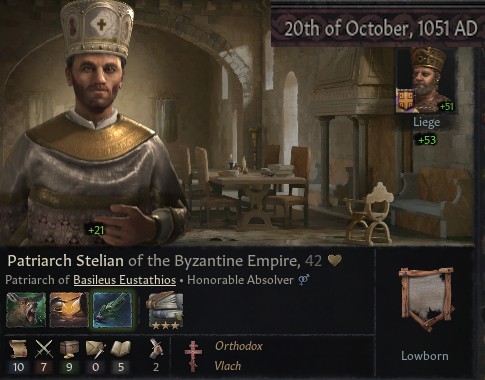
***
έτος Κόσμου 6563
To My Bishop Nikoloz, In The Year Of The Universe Six-Thousand-Five-Hundred-Sixty-Three, I Send Greeting In The Lord
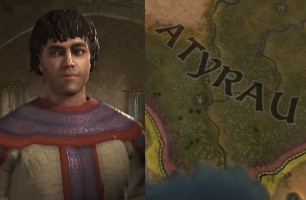
I have observed that the locals I had met in the past seem to be busier in their hectic happiness, as this small city of wooden walls has flourished since then. There are more cottages and buildings of both wooden and stone, but I can say that there are still nomads surrounding the city, incoming, resting, and outgoing, of merchants, of wanderers, of hunters, of herders, residing in their tents. The word yurt, of which they name for tent, I do remember from my journeys in the past, yet there are also those now, who name it ger, for which they call their home.
Of the most I am able to understand the tongues, now I have learnt it is one of the many other variants. Unfortunately, those spoken by the ones living in their gers, I have to admit I do not know their tongues, even if I can hear a bit of similarity to the ones I am familiar with.
I have made my preparations for the journey beyond the delta. The locals behave friendly when I show my skills of speaking their tongue, and yet when I meet someone of a different sound, they try their best to help with my requests, in any common tongue we can find on the occasion. What I heard from the Khazars of this city, is that their khan is a just man, and most I have met so far are happy to live in this corner of the world. However, I have not met any Christians, not among wanderers nor merchants. Many of the nomads are worshipping their strange gods. But as I said to you before, to your much surprise, there are those also following the word of the God, through the Law of Moysís, in these lands north of the Kaspia.
Unfortunately I could not find my close acquaintances I had nine years ago. I was counting on meeting the confidants I was able to find back then, but now I do see it is a futile attempt. I do know the way but only for travelling up to this land, thus I will have to establish new contacts for the roads ahead, assuming there are roads to follow. I do not have high hopes, therefore I will plan for the worst misfortunes that may happen.
Father Nikoloz, I need to write once again, I am eternally grateful for your guidance and help. Yet I have to admit, as I undertook this journey, I am still lost in the sleepless nights of agonies. I am still haunted by the nightmares since I had been summoned for this quest, depriving me of nights of the tranquillity. It gave me immense honour to be considered by the Holy Patriarchate for such an important task, yet as before, I lost my days of the serenity in the horror of my sin once again, however I was forgiven. The conversations we had with your blessed words soothed my soul, but once I started my journey for the mission, the nightmares have returned to curse on my nights.
*
To The One Forgiven Of His Sins, In The Year Of The Universe Six-Thousand-Five-Hundred-Sixty-Three, I, Bishop Nikoloz Of Vanand, Send Greeting In The Lord
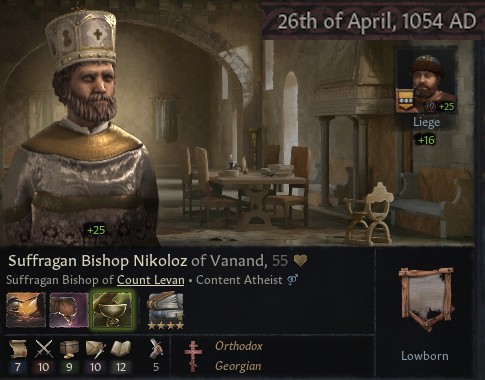
I am afraid I have to write in discreet words to protect you, but I will never hesitate to send my letters to you, for they may guide you. I am not in the fear of my lowly life, but of yours. I told you this before, as the mission you are given is a sacred quest in the eyes of the Patriarchate, yet the earthly rulers and the ambitions of men are ever devious in corrupting the souls of those who are supposed to bring the divinely salvation. Remember the conversations we had before you left for the journey. You must be more careful than you ever can be, as the dangers may come not only from the lands of your quest, but unfortunately by the very nature of your quest, even from the lands of your home. The Patriarch of The Council may have other plans that we are still unaware of. Be vigilant, child, and God All-Mighty will protect you, for He is the One Who loves us. Walk your path knowing that you are forgiven of your sins by the words of Our Lord, and the peace will arrive in your nights for you are doing the work of Him.
*
To My Bishop Nikoloz, In The Year Of The Universe Six-Thousand-Five-Hundred-Sixty-Three, I Send Greeting In The Lord
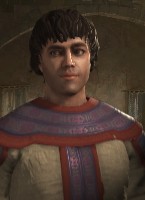
According to the locals, most are riding from the north and the further east, but not moving nor wandering for their seasonal needs at all. They are migrating, and actually, they are fleeing. The answer to my obvious questions was ominous: There is a war between the tribes in the north.
I have met and talked with many as possible, trying to understand who are fighting in this war, a war that makes many flee their realms, but I gave up in frustration, as most of the answers have become obscure and incomprehensible to my knowledge. Whoever the belligerents are, I sense that it might be related to the grim rumours that instigated my quest.
I do know that I am regarded as a stranger, yet I am unable to understand the reason behind the vague answers I have received so far.
I began to search for companions who can guide through the pathways beyond the sea, who know the foreign tongues I do not know, and whom hopefully I can learn these from. I persuaded six riders of the steppes for the journey ahead, telling them I would like to travel to enjoy the riches and making trade agreements along the way. They are from the lands far beyond, speaking those tongues I am unfamiliar with. Even though they did not say much about their faraway home, they gladly agreed to teach me their words. One of them is from a realm called the Chan, and the others call themselves Mongóloi.
*
To My Bishop Nikoloz, In The Year Of The Universe Six-Thousand-Five-Hundred-Sixty-Three, I Send Greeting In The Lord

Theodotos is the younger of the two, a man with stern eyes, looking directly at one’s soul, as if trying to value the worth of his acquaintance. He walks with confident steps, while his head is turning towards any sound he hears, but not in a fearful manner. His words are supporting his vigilance, they are coming from a strong heart, his hands are always open, always ready.
Ioseph, on the other hand, is a man of silence. When he talks, the words are reduced to a couple of mere sounds. When he first talked, that was only reserved to explain for what and how he came to find me. His eyes are always narrowed down, but rather than calculating, they only show the dismissive attitude he has for anyone he talks to.
While Ioseph is keeping his soul away from anyone that might try to understand his stance, Theodotos has been open to those who would like to talk to him. They told me that they rode from the Basileia in order to find and join me in my quest. They revealed their scrolls sealed by the Patriarchate, showing me they are tasked with aiding me in my journey. I told them that I am happy to see fellow citizens from our home, and accepted their companionship. I had no other choice, as they already found me, knowing who I am, and for what purpose I am travelling in these lands. We will journey together once the paths are cleared off the chaos of the fleeing bands.
Yet I do understand what you tried to warn me of, Father Nikoloz. I trust none of them.
*
To The One Forgiven Of His Sins, In The Year Of The Universe Six-Thousand-Five-Hundred-Sixty-Three, I, Bishop Nikoloz Of Vanand, Send Greeting In The Lord
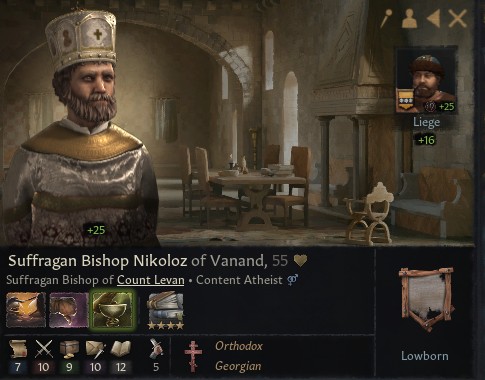
*
To My Bishop Nikoloz, In The Year Of The Universe Six-Thousand-Five-Hundred-Sixty-Three, I Send Greeting In The Lord

The migrating tribes are lower in numbers, and we will journey beyond the delta of Atirawi in the morrow. However, the actual reason for my decision is that my nightmares have ended.
While we were accommodating in the new tents I acquired during the long wait, three days ago a band of riders arrived in the city. I was intrigued with their illustrious might, and I asked among the locals to learn more about their nature. I was told the band is leading a prominent couple in their journey through the steppes, riding from lands far beyond.
In the nights of the city, fires arise from the many hearths on the plains surrounding the wooden walls for gathering groups of riders, serving as taverns of the open fields, without the limits of the walls one might expect from such facilities. The prominent couple’s band was resting around such a hearth slightly distant from the walls on the night of their arrival. I moved my company closer to theirs, and I approached the hearth surrounded with their tents. Theodotos asked to join me, providing his support in my plot. I agreed, while concealing my discomfort for his presence.
I requested an audience with the leader of the riders, but in the tongue of Toúrkoi common to these lands. At first they looked at me with suspicion, then one of their servants answered me, but with a question, asking for my purpose. I told them I am a fellow traveller, and I would like to share my knowledge of the lands. I told I would be delighted if I can be of any help, and I asked in return I would like to know about their journeys, so that I can establish secure contacts for trade. They asked me if I was a trader, but with eyes under knitted brows, and at that point I sensed that I made a mistake. Yet I continued, answering to reassure them that indeed I am a trader.
The servant of the band repeated his question, and I was certain of the mistake I made. The other riders stood up, readying their garments, along with their blades. The servant asked once again, but a different word he used; one that I do not know its meaning as of yet: He asked if I have a tamga.
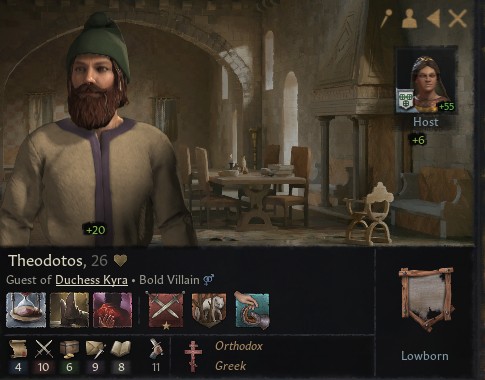
Before the blades were to be drawn, I saw Ioseph, approaching with open hands. The silent nature of him was no more, and his loud voice was resolute at every sound of every letter in every word he used.
He spoke the strange tongue of the band.
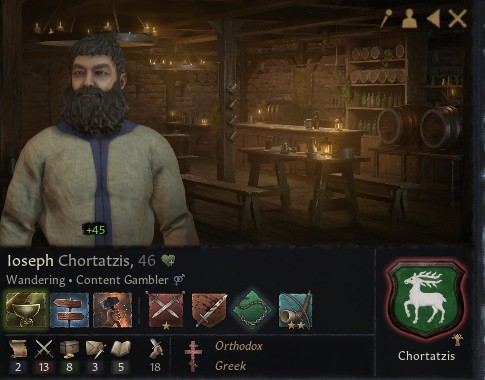
We parted from the hearth, and returned to our own side of the plains. The rest of the group I gathered were sitting around the fire, and Theodotos parted to rest. Ioseph sat next to the fire, and locked his eyes on it in the silence since the encounter he was in. I waited until the deep of the night. When I deemed that it was the moment for my questions, he spoke before I could. He was also waiting for the others to sleep, but to talk to me. “Do not tell words of lies to the people we will see in the steppes. Especially lies that you cannot support to show as if true. Fellow traveller. They understand these words, but not as you dismiss their true meanings. You are not their fellow, and you are not riding with them.”
I was astonished with his answer, yet I was able to ask in response to what he told me: “Then how should I have addressed them?”
“Friend. That will suffice.”
On the contrary to his mild voice, his words were harsher than angry screams. I asked how he learnt to speak the tongue of the Mongóloi. He remained in silence. Regardless, I kept asking him how he persuaded the band out of the clash, as his silence grew longer. I told him I am eager to learn the tongue of these people he is able to speak. He broke his silence, but with the shortest answer he could summon.
“No. Ask your other companions.”
My frustration for his taciturn demeanour was about to fail my calm voice. He did not even bother to look at me, but started to tend the fire with a stick. I asked him about the meaning of the word tamga, but was left again without any response. Then I raised my voice: “If you are not going to talk, then as you wish. But at least tell me who they are.”
He stopped, dropped the stick, and looked at me, but without moving his head. “We will need to acquire a tamga, if you are going to introduce us as merchants to others as we travel.” Then he paused, as if trying to find the necessary words. “I do not know who they are. They are of noble blood, and you should accept it these people are not simple-minded barbarians as you expect, if you are determined to continue in this quest of yours.” He paused for a longer moment than before. He stood up, intending to leave the uneasy conversation we were having, then he said the last words for that night.
That night I slept but without the haunted horrors of my past. Father Nikoloz, I will continue in my journey, and I have my faith in God All-Mighty, that He guides me with His devices ever-unknown to us. I will accomplish this sacred quest I am tasked with.
I feel my heart is beating faster than before, since that night, and even as I am writing these to you. I was nervous about the roads ahead of me, but that night I was intrigued by what Ioseph talked about, and in particular by the last words he said before he finally parted to rest.
“I do not know, and that bothers me. I could only understand what the words are, but I do not know what they meant with them. They told me they are of the daughters from rich lake.”
Publishers'-Edit 26.03.2024: Corrected publication mistakes. Correction on the format.
Last edited:
- 2
Is this constituting something of a backstory for the Friend from the earlier parts of this AAR? Interesting to see the internal conflicts and the difficulties in cultural exchange between the Friend and the Mongols in this story. Always a pleasure to see an update!
- 1
- 1
And it is always a pleasure to share the story;Always a pleasure to see an update!
And it is always a joy to know being read;
And it is always the bliss to be able to salvage the damn files out of a faqing failed harddisk so that now can resume writing
And -
Is this constituting something of a backstory for the Friend from the earlier parts of this AAR?
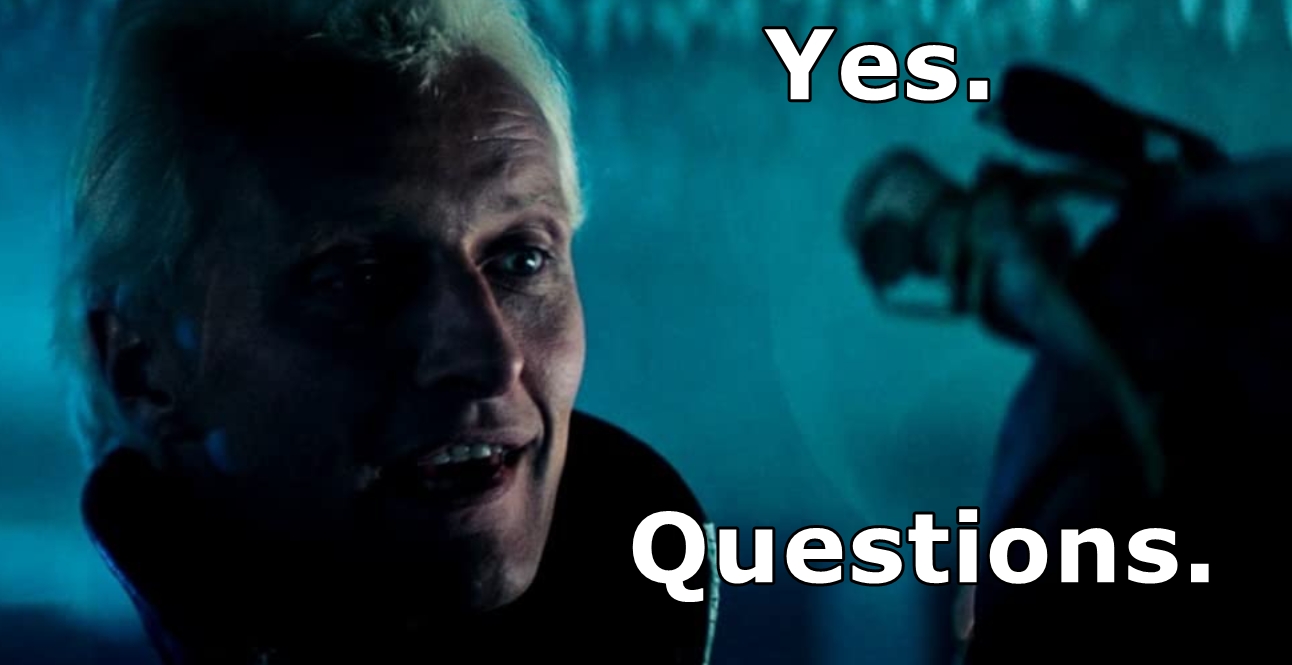
This is the beauty of narrating in a recursive nature. While the time proceeds on its course, the tools for writing about the future that has already happened, and then to foreshadow the future-beyond that is yet to happen became already available as mentioned before; in the previous volume, the age of the Chinggis Khan Ariq was told to the Rhomaios by the Friend, and now the age of the Friend can be followed as lived by the Rhomaios.
And not to mention the delight of slightly-puzzling-confusions caused by the author for the readAARs on who is who, by deliberately obscuring the two characters -or actually, their names; but using the pseudonyms of them as they are given to each other by their counter-parts; so,
(...) between theFriendRhomaios and the Mongols (...)
And again, all the while the timeline continues on its course, and without ever a need to explicitly distinguish any part as a prequel or a sequel or etc.
But have already said too much, and not fond of giving any detail for what will be published next -so colloquially, not keen on spoilers-; hopefully the rest of the Volume II will satisfy the question, while bringing even more.
- And it is the epitome of pleasure to have questions as well as trying to answer; cheers mate!
- 1
Thank you for the update. Misuse of the simplest word can lead to the greatest of disagreements.
- 1
Threadmarks
View all 36 threadmarks
Reader mode
Reader mode


